#i think it also just is a way for him to reassert his own identity to himself
Explore tagged Tumblr posts
Text

it comes with such a serious moment but it makes me laugh, like in a miserable way. praise speaks so much to his pride (coughpraisekinkcough) , and knowing that it all stems from the thousands of years spent talking at the brick wall of the evanuris, unheeded, condescended to, his very NATURE as wisdom unwanted, makes me ill. stroking his ego is funny as much as it is tragic.
#𝑶𝑶𝑪. communing with spirits. (ooc)#tonight on: harrow reads tooooo much into things & makes himself sad#i think it also just is a way for him to reassert his own identity to himself#like “SEE??? YES I DO KNOW BETTER”#as untrustworthy as He is#he appreciates trust in his capabilities
9 notes
·
View notes
Text
Montresor (and Willtresor) is the Bad Ending of the White Raven IV: the saga continues
Okay, now that these chapters have been released I can talk about this issue. I must say that this twist has been just the way I like twists: no, the surprising thing is not that it happened, but that, when you look back, it not only makes sense, it also recontextualizes some little things that stick around.
A person who is not there
There's one thing that's cross-cutting to these four idiots: they're absolutely desperate for someone to look at them. And when you think about it, it kind of makes sense: Lenore has lost the one person who seemed to even slightly care about her and locked up like an animal, Annabel is a hypocrite so terrified of being perceived as crazy that she's a breath away from collapse, Will is the kind of guy who blends in with the walls to such an extent that hardly anyone remembers his face, and Montresor has been seen as an devil since fucking birth.
However, the fine line that separates the Annabel/Will and Lenore/Montresor duo is drawn into something quite complicated: who are on the edge of the abyss and who can't fall any lower.
Both Montresor and Lenore, for different reasons, are trapped in inescapable situations: Montresor will never be anything more than a shit-talking charlatan in anyone's eyes and Lenore will die before she shakes off the label of a madwoman.
Then, they come along. These two people who have not only been able to look them in the eye, they are also people in whom they can see themselves reflected: a weak pushover who can't fend for himself and a lady who is one mental health slip away from being put in a straitjacket.
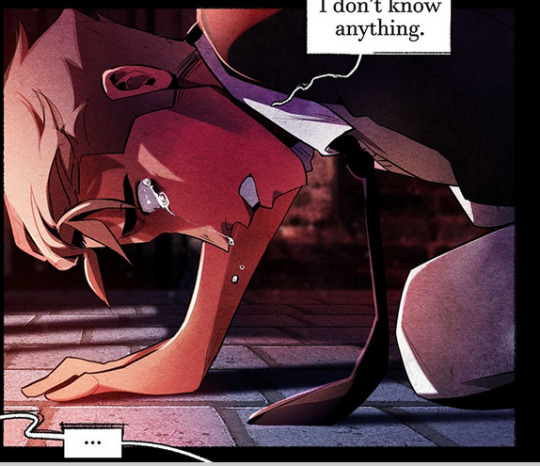

They have been that person. And their desperate cries for help have never been answered.


But this time may be different. If Lenore and Montresor can save Annabel and Will, in a way, they are also saving themselves. A 50/50 between a selfless motivation and a huge reassertion of one's own ego.
Which leads to the first difference.
Where Lenore offers Annabel a deal on equal terms, a “you and me against the world, baby”; Montresor has with Will a relationship based on subordination: it is he who must take care of Will and, thus, Will is beneath him.


What Annabel and Will understand from the arrangements of this deal are two very different things: where Annabel must live up to the extraordinary person that Lenore is in order to accompany her on equal terms, Will must make sure that he is a weak individual that Montresor can take care of and mistreat in order to feel superior when necessary.
This is not a problem for either of them because there is one little thing that Annabel and Will are able to mold as if it were plasticine: their identity.
Fragmented identities
These scenes have exactly the same purpose.
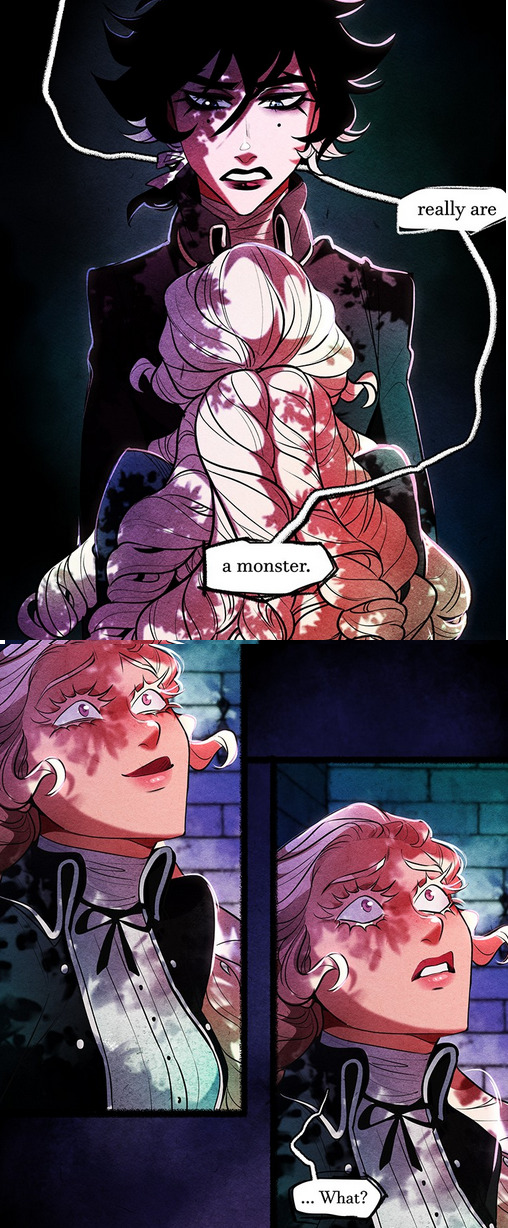
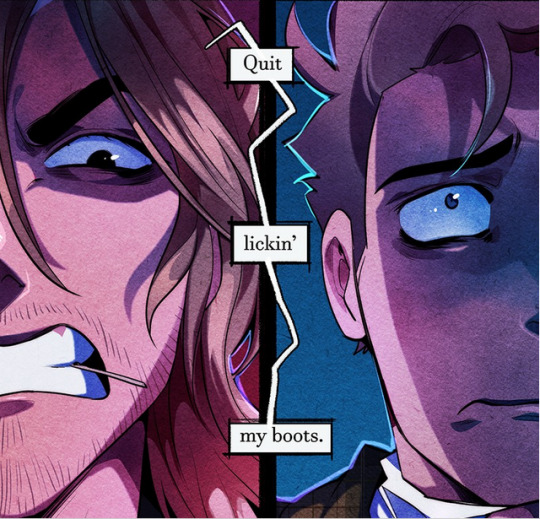
And I absolutely love them for that.
But let's take them one at a time.
Both Annabel and Will are two invisible people who at least feel like they've been saved by their favorite person. Lenore is Annabel's knight in shining armor and Montresor is the bad boy capable of moving forward despite everything that Will longs for.
They love them. And they need them.
Because Annabel is just a pretty accessory incapable of thinking outside the golden cage she's lived in all her life. And Will is incapable of thinking for himself because he doesn't want to deal with the responsibility of doing so.
So they build this perfect mask to please their special people. A carefully chiseled mask tailored to be loved based on what they believe their special person wants from them.
In both scenes, Annabel and Will have their world fall apart as they realize that the mask they have created for their loved one is not only unwanted, but viewed with disgust and contempt. So the mask slips for an instant to reveal what lies beneath only for their special people. But to very different ends and consequences.
Annabel drops her self-imposed role as unbeatable queen, begins to cry her eyes out, has a panic attack and even -to Lenore's surprise and horror- comes to doubt that she is loved. She is far from living up to the role she should have: she is scared, lonely and, from her reaction, probably doesn't even want to do this.

Of course, Lenore swoops in to comfort her because her beloved damsel in distress is in a vulnerable moment. But all it takes is for Lenore to suggest that Annabel can approach other people for the unbeatable queen to come back: even pushing her to the limit hasn't gotten her to get what's really going on out of her. And after Annabel would rather have Duke and Pluto throw her off a balcony than allow Lenore to reveal herself as a traitor to her friends, it is definite that Lenore has lost this battle: she has already exhausted all her options which have ranged from pleading, to loving words and, in this scene, to verbal violence. The unbeatable queen is in a place where she can't reach her and any future attempts will only succeed in putting the two of them in a more complicated situation.
On the other hand, Will has a small moment of vulnerability with Montresor, giving her this little speech that works as a confession: this confusion about whether he wants him or wants to be him is, as I read in some places, a fairly common situation among gay men. Before he dies, he ends up stealing Montresor a kiss.

But all this has been nothing more than to see his reaction. Because Will is not dead. Not at all.
Although he's put his feelings on the table, he doesn't seem to expect Montresor to return his affection. Just knowing that he cares seems to be enough for the moment, because he plays dumb after it all happens. But Will's made it pretty clear that he is capable of an enormous level of manipulation and that he works with a subtlety that even Annabel couldn't dream of.

Now that they've gotten a peek at what's beneath the masks, Lenore and Montresor find themselves trapped with monsters of their own creation that they are unable to comprehend: Lenore can't even fathom why Annabel continues to do this despite how much she's suffering and Montresor doesn't even know what Will's intentions really are.
Kind of deliciously ironic because didn't Lenore want her partner in crime? Didn't Montresor want his little mutt to fight a little?


Weren't they the ones who wanted to be their number one?
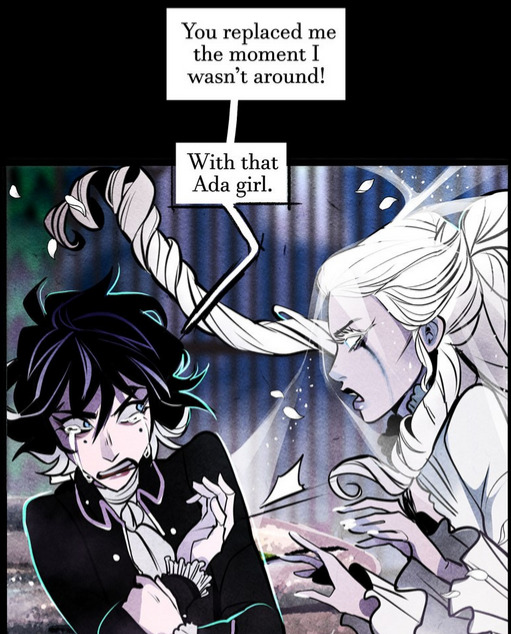

And, as the icing on the cake, they are alone in this, because the monsters they have created only let them get close. Everyone else in the world has been fooled by Annabel and Will's perfect masks, so if they wanted to (or even could) tell anyone about this absolutely no one would believe them.
Even if Lenore wanted to convince her friends that Annabel isn't a homicidal maniac, it's virtually impossible for them to believe her after what happened with Duke. And Montresor can't even begin to explain what Will did.
Love and control
Here I need to stir up the duos a bit.
Montresor and Annabel are not only blonde charlatans with parental problems, they have also learned to relate to the world in terms of control: they protect themselves by moving others around like pieces to get them to do what they want (at least in Nevermore, Annabel in life would not have been able to do these things as far as we know).
Where Annabel puts herself at the center of the board as a queen, Montresor is all about pissing off everyone around him because that's the only way he feels seen.
But they are not the ones with the upper hand in their relationship.
Will and Lenore have demonstrated by actions -we can't be sure in Lenore's case it's a conscious thing- that they are capable of giving all the affection, security, and loyalty if they get what they want from Montresor and Annabel.
It's hard to know what Will wants from Montresor at this point, but he seems quite content for his bad boy to remain his bad boy who has something resembling a soft side to him. In Lenore's case, this waltz between having doki dokis every time Annabel exists around her and being absolutely furious seems to be tied up in her desire to have Annabel by her side: when Annabel plays queen and walks away, pushing Lenore away from whatever is going on; she immediately becomes wary or, at worst, aggressive; but is caring and responsive when Annabel shows a vulnerable side.
This ends up generating a funny situation where the relationship between Montresor and Will is more functional than Lenore and Annabel's because there is one side subordinate to the other: Will has Montresor by the balls, but lets himself be mistreated; while Annabel refuses to put Lenore's desires above the danger they are both in (and even refuses to tell her what the fuck is going on).
Conclusions
Okay, I have to admit that I have been a bit dramatic in some parts of this essay and I have to rectify that so that you are not left with the wrong idea.
The first (and most obvious) thing is that it looks like Annabel is going to get to have honest relationships beyond Lenore. Of course, her friendship with Ada and Prospero can't really begin until the “allies till battle royale do them part” deal is dissolved and she's confronted for putting them both in a sticky situation. That yes, they signed up to be allies of the Machiavellian mastermind, but to Caesar what is Caesar's: no real friendship will form here until those bumps are crossed.
And speaking of Annabel, if there's one person who has a microscopic chance of believing Montresor the fucked up shit Will has done, it's possibly Annabel. My only argument is this:
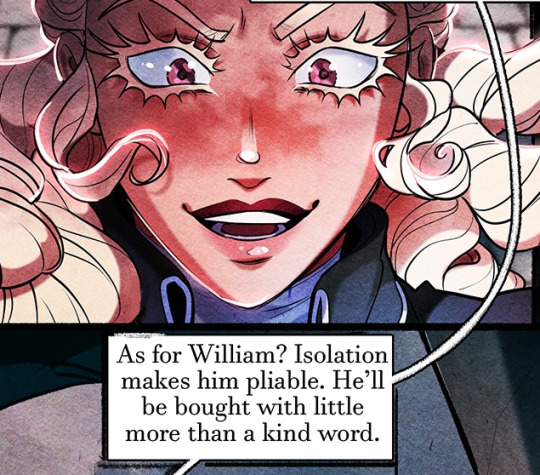
Like, she doesn't say Will is harmless, she says isolation makes him pliable. And although she is underestimating him and not knows Will is a threat, but maybe she'd be willing to think Montresor isn't crazy if she finds out what happened.
Another point is the conclusion she ended up coming to in all these trials: the line that separates things is drawn on who has their heart in the right place and who doesn't. So, where Montresor is terrified of Will while Will holds a threat over Montresor's head, neither Lenore nor Annabel is afraid that the other might hurt them. And while we don't know what Lenore's feelings are about how she's been treating Annabel in some respects (this for the date I've uploaded this essay), if her face in this scene and the little spoiler that was uploaded to tumblr tell us one thing: It's that the answer is probably guilt. Let's see what comes out of that.


Finally, there's one not too nice thing I'd like to say about when I saw spoilers from the fast pass. Okay, I know this comic is moving at a snail's pace and that while it's been a few days for the characters, this chapter came out like fifty weeks ago. But people, with all my love: I want you to see the difference between Ada and Will's reactions in this scene. Ada is obviously uncomfortable and guilty; while Will has an “upsi” face.
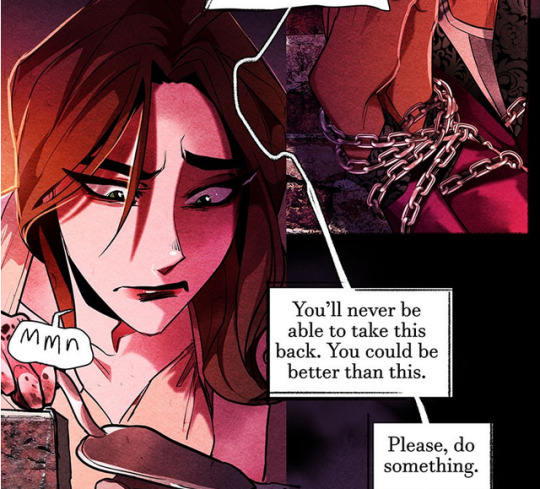
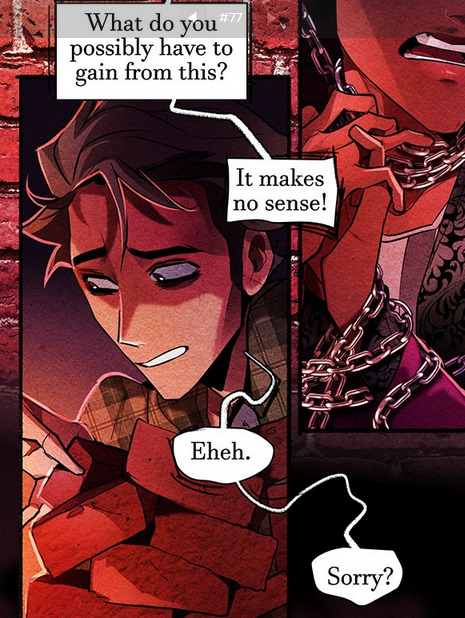
And when Lenore confronts him, Will has the face to complaining that he is scared. He at no point in this confrontation shows a single shred of real remorse.

I know there are people who have been through abusive relationships who have identified with Will and I don't mean to go on to bring that up. But what these scenes raised at the time is that there is something off about this guy, something that should give you a bad feeling because his behavior doesn't fit that of a person who has been forced to do something terrible.
Another thing I've seen someone point out at the time is that Will feels different in his character presentation and has been getting more pathetic as we see him more screen time. We now know that he has been learning how to behave.


Add to that that his reaction is the only one we don't see when it's revealed that there's only a second life available and we only see it when Montresor shakes him. But he doesn't seem particularly affected beyond the chaos that's going on around him.
All these little things keep telling you that there's something wrong with Will. And what Chapter 120 does, is show you what the thing that didn't add up was: what we've been seeing so far is a mask worn by a much more twisted individual and, now that we know that, we can start to figure out who he is and what he really wants.
This, people, is William Willson in all his glory. And Will turns out not to be the protagonist, but the doppelganger tormenting him. I don't remember who said that theory, but: you were absolutely right.
Anyway, this has gotten long. Thank you very much for making it this far.
#nevermore webtoon#annabel lee nevermore#lenore nevermore#annabel lee whitlock#lenore vandernacht#white raven#nevermore webcomic#annabel lee x lenore#lennabel#Willtresor Nevermore#monty nevermore#nevermore will#I didn't know how to put this in the essay but also#where Will and Lenore make themselves look weaker than they really are#Montresor and Annabel pretend to be stronger than they really are#On a positive note: now I need Will and Annabel to have a cup of tea while talking about their crush#I like to think Annabel would come out of that conversation very horrified jajajajaja
190 notes
·
View notes
Note
how do you think the diaboys would react to a s/o who is extremely strong physically and can basically beat anybody’s ass human or vampire?
Oh lord bless the S/O's heart T_T
================================================================================================
Sakamaki's
Shu Sakamaki:

He is very into it. Mostly because he doesn’t have to lift a finger. You're the ultimate bodyguard/girlfriend combo and he absolutely abuses that. Someone threatens him? He just lazily glances your way. “Handle it, won’t you?” And when you effortlessly take down a threat that would normally make vampires blink twice? He chuckles. His yandere tendencies will flare up though—your strength excites him but also makes him want to keep you leashed tight.
“You’re so... troublesome. Don’t ever leave me, okay?”
Reiji Sakamaki:

He is both horrified and deeply impressed. At first, he sees it as an unruly flaw—"Brute force is not elegance." But after witnessing you bodyslam one of his brothers mid-rant and then calmly ask if he wanted tea afterward, he can’t help but reassess. If you're his, he wants to refine your strength, turn you into a deadly weapon with poise. And if anyone lays a finger on you? Reiji will smirk and say,
“They’ll learn. One way or another.”
Laito Sakamaki:

Absolutely feral for it. The idea of someone who could pin him down effortlessly and isn’t afraid of his vampire status? Instant obsession. “Nfu~ how scary... I love it.” He constantly tests your limits just to get you to toss him around flirting with danger and you. But if anyone else tries to provoke you? He’s standing smugly behind you like, “Oh no~ whatever shall we do~?” Fully leaning into the idea that he bagged the strongest creature in the house.
Kanato Sakamaki:
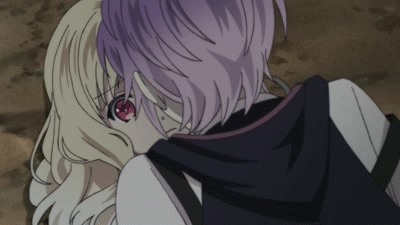
At first? He hates it. He wants a doll—not a warrior. But when someone dares insult him and you snap their arm like a twig with zero hesitation? He sits there wide-eyed and breathless. It unlocks something new in him. “You’re...stronger than everyone,” he whispers, eyes glittering. “You could destroy them all for me… right?” His obsession multiplies tenfold—he’ll demand that your strength be used solely for his protection and revenge.
Ayato Sakamaki:
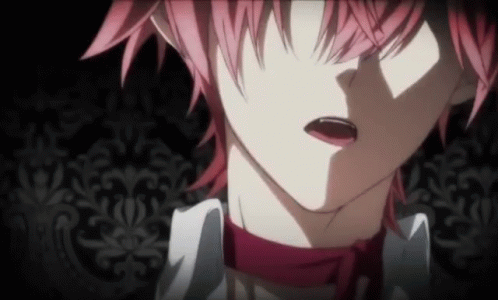
BIG ego hit at first. “Oi, Chichinashi—are you saying you’re stronger than me?!” Yes. Yes you are. But after a few sulking sessions and you lifting him bridal-style just to shut him up, he secretly loves it. He starts bragging to the others: “Yeah, my babe could crush your ribs with a hug. Jealous?” Just don’t hurt his pride too much, or he’ll start picking fights for you to prove your love (or to reassert dominance and fail hilariously).
Subaru Sakamaki:
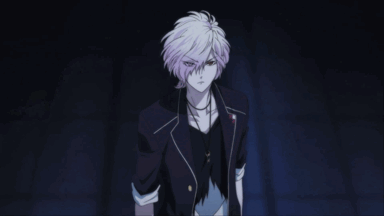
Massive identity crisis. He spent so long hating his own strength, being terrified of hurting others—so to meet someone stronger than him who wields that power with control? It shakes him. At first he feels inferior. But over time, you become his anchor. You’re the one person he doesn’t have to hold back with. And when he sees you in battle—calm, efficient, terrifying—it leaves him staring. “...You’re amazing.” He might still blush when you piggyback him though.
Mukami's
Ruki Mukami:

Completely composed. He admires strength—especially when it’s wielded with intention. He’d want to understand how you came by it, how you control it. He might even train alongside you if you let him. He has no shame in admitting that you're physically superior; in fact, it turns him on in a very understated way.
“Livestock… no. You’re a beast. And I… am fortunate to be yours.”
Kou Mukami:

Publicly? He plays it cool. “Mnn~ my darling is so scary, fufu~ everyone’s terrified of them.” But privately? He’s a bit scared himself. Not of you, but of how little control he’d have if he ever pushed you too far. It makes him think twice. Still, he loves the spotlight your power brings—fans, enemies, other vampires all in awe of his partner? Yes, please. Just expect lots of joking praise and subtle yandere moments where he wants to make sure you only fight for him.
Yuma Mukami:

Absolutely THRILLED. Finally—someone who can keep up with him. He challenges you to arm wrestling contests and field duels like it’s foreplay. The two of you spar for fun and leave craters in the earth. He’s never had someone who could punch him in the gut and make him laugh. He respects the hell out of you and calls you “Tank” or “Boss” just to mess with you. Truly a power couple. You two could take over the world, honestly.
Azusa Mukami:

His reaction is the most emotionally complex. He’s awed by your strength but also fears you'll leave him behind. But when you show gentleness with him—despite being able to crush bones? He melts. He becomes incredibly attached. “You…could kill me���but you don’t. That’s…love, right?” He’s amazed by the fact that you choose to protect, not harm. It gives him hope and a reason to love himself more. You’re a warrior—but he sees you as an angel.
Tsukinami's
Carla Tsukinami:
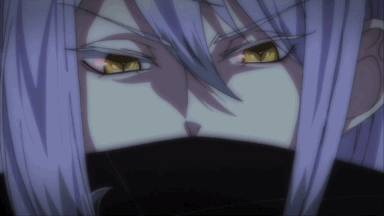
Impressed. Deeply. You’re a rare human with strength rivaling (or exceeding) that of a First Blood? That catches his attention immediately. He’s intrigued by your origin, your power, your restraint. He considers you a valuable asset—and if you're his partner, he considers you a precious rarity to be guarded. He’ll test your strength, but mostly to understand it. And while he’ll still act dominant, there's a quiet reverence in the way he treats you.
Shin Tsukinami:

“WHAT? You’re stronger than ME?!” Cue wounded ego. He hates it at first and tries to challenge you constantly. Loses. Every time. Eventually? He starts to admire you. He likes that you’re fire to his storm—hot-tempered, violent when needed, but still capable of affection. He’ll spar with you constantly to “reclaim dominance” but it’s thinly veiled flirting. When you protect him from danger once, he actually stutters.
“T-That doesn’t mean I needed your help or anything!!”
22 notes
·
View notes
Text

Hi anon, I'm just taking a screenshot of your ask like this because I don't want to include the link. I have no desire to start a fight.
First of all, no hate to the OP of the post, this just my opinion. But there are some things I do disagree with.
First, the point about the Blue Spirit. I don't think the Blue Spirit is some vigilante for justice, but it does represent that Zuko will do anything to appease his father, including breaking into a Fire Nation stronghold and essentially "betraying" his country. Which is in action a good thing, but Zuko's intent doesn't support that narrative. The Blue Spirit is not a good thing, and its logical extension is Zuko using it to steal from people later and trying to steal Appa as the Blue Spirit. Which is he has to take it off to have that frank conversation with Iroh, he has it off when he frees Appa, and he throws it away at the end of the episode. Zuko's struggle is about identity, and the Blue Spirit is a mask that is made of Zuko's desire to please his father, which means doing actions that are against who he is as a person. Which is why he throws it away when he begins his initial change.
As for the point about Zuko holding onto his birthright despite being an outlaw and the show not exploring what it means for him to be cut off... it does tho. We see Zuko struggling with finding who he is without the influences of his father and the Fire Nation. We see him learn about new perspectives because he's lost his ties to the Fire Nation. Zuko being cut off from the Fire Nation is shown in him being forced to travel through the other nations and understand them, while also learning some truths about his own nation that he would not have if he had remained on his ship. He still continues to hold onto his role as the crown price though, because it's all he has. He's clinging onto it desperately because he still thinks that he has the chance to go back to his father, and he still doesn't want to accept the truth about him. It's an interesting dichotomy. We can see that Zuko is trying to embrace his own identity here (Ursa's words) but his image of who he is is still skewed and influenced by his father. He's starting slowly, but he still has a long way to go.
This is long so I'm putting the rest under a cut.
As for Zuko not being driven by a desire to help the Fire Nation, I would have to disagree with that as well. I actually do agree with OP that they could have shown Zuko interacting with the Fire Nation people more, but it's not just in The Boiling Rock that he says he wants to help. He expresses that sentiment as early as The Day of Black Sun, Part 2 in his speech to Ozai, where he reflects on how the Fire Nation is feared and hated and it has to change. So it's not out of the blue for Zuko to care for his nation, but I agree that they could have shown that way better. Honestly on rewatch, Season 3 made some... interesting choices.
Now for the part about Song. I don't know why it's so surprising that Zuko did what he did. This is, after all, him in the very very beginnings of his arc, and he has just been confronted with a very shocking truth. He's not in a good headspace here at all. He's been stripped of everything he's ever known, he's being hunted down by own sister under the orders of his father, and Song unintentionally poured salt on an old wound despite her good intentions. All this does not make Zuko receptive to the knowledge that challenges his entire worldview like this, that the Fire Nation hurts innocent people. And now he is feeling compassion and sympathy for this Earth Kingdom girl and horror against his own nation whom he has been told is doing the right thing. And on a personal level, it is the first inkling of a realization that his father may have been wrong to hurt him as well. So, he lashes out. He's not in a place where he can accept everything he's learning, and so he tries to reassert himself by stealing her ostrich-horse. It's a genuinely shitty thing to do, but it's understandable. I think Zuko being apologetic would be the OOC choice.
And the points about Zuko's stealing are... well, OP's criticisms are kind of the point. I agree with their assessment that the Blue Spirit is not a good thing as I have written above. Which is why those scenes make sense. Zuko at that point steals as the Blue Spirit, an extension of the "desires" of his father. Which means making choices like his father, making bad choices that are not like himself. He does very shitty things and steals from innocent people using the mask. Then we come to Zuko Alone. At this point, Zuko has been on his own for a while. This episode is all about understanding who Zuko is, the choices he'd make free of the influences of others. There is no Blue Spirit mask in this episode, and that represents him slowly being removed from the negative influences that made him put on that mask in the first place. You'd think that after his previous robberies, that he would continue that line of action, but he doesn't.
There is no Blue Spirit mask here, just Zuko in all his messed-up glory. And the kind of choices Zuko starts to make without those influences includes not stealing from the pregnant woman, covering for Lee when the soldiers want to know who threw the egg, and then going back to save him. Of course, the end of the episode also shows us that Zuko as a person has not yet embraced and understood who he truly is outside of his father, but it's significant that the mask isn't in this episode and the ones following it, because Zuko Alone is the episode to help us understand who Zuko really is deep down, and the following ones are devoted to him learning who he is outside of his father. And he only puts it back on in the episode Lake Laogai, when he is slipping back into old habits and trying to steal Appa for his father again. And at the end of the episode, he throws it away.
As for Zuko's arc not involving making amends, I guess Season 3 was already on some tight pacing and there was no need to revisit one-off characters who didn't even have names just so Zuko could apologize to them? We know that Zuko is regretful of his actions and has learned better, and it is 100% believable to me that he tracked them down to apologize and make things right. I honestly think this is a weak criticism. We don't have to be shown everything, there are some things we can imagine and conclude ourselves. It would have been nice to see, but there were other things that were more important, and the narrative had to prioritize.
About Zuko's arc revolving around Iroh and him only doing what Iroh wants... using the Season 2 finale's line of Zuko worrying about betraying his uncle isn't the finest way to prove that point. Zuko worried about that because it was the immediate and most personal action he took when choosing to side with Azula. Iroh is literally in chains at this point, and Zuko isn't in a place where he is still ready to accept that his nation and his father have done bad things and hurt people. He still doesn't think he did anything wrong by siding with Azula, other than hurting Iroh. It is through his time in the Fire Nation that he is able to make these realizations. Zuko was won over by Azula because she offered him the one thing he had been desperately craving for years, which was the love of his father and the chance to go home.
The entire point of book three is that Zuko makes his own choices without the influence of Iroh, because ultimately, the decision to change and be better has to come from Zuko himself. Iroh can guide him, but Zuko has to be the one to make the decision and put in the work. Iroh is very purposefully not a huge part of Zuko's Season 3 arc aside from Zuko thinking about him and Iroh giving him that crown, because Zuko needed to make the choice to change himself. It's even literally spelled out in the show in The Old Masters:
Iroh: [Releases him.] But you found it again. [Frontal view.] And you did it by yourself. [Frontal view of Zuko over Iroh's shoulder.] And I am so happy you found your way here. [Side-view. Hugs him again.]
As for Zuko always agreeing with Iroh and Iroh always being right... this is a common thing for shows like this to have mentor characters who are the moral guides for the characters in the show. Iroh is supposed to represent the "right way." ATLA actually does this very right. Zuko is supposed to embrace Iroh's worldview, but not because he decided to blindly follow Iroh, he agrees because he's learned what is right and wrong by himself and is now in a place where he can agree with Iroh. And Iroh himself is done so well because he's not a moral arbiter whose always right and can never do anything wrong. He is someone who is so wise because he's made several mistakes and has had to learn what the right thing to do is the hard way. I think ATLA actually managed to avoid the pitfall of making Zuko look like he can't think for himself and can only follow Iroh blindly very well.
And I don't understand what Iroh said that was so questionable? Aang has to fight the Fire Lord because Aang is the Avatar. It's literally his job and something that has been building up for the whole show, and Iroh is wrong for saying that Aang should do his job? It's unfortunate that Aang has to endure this responsibility at such a young age, but Iroh is right when he says that only the Avatar can defeat Ozai. And Iroh sending Zuko to fight Azula isn't the same thing at all. Maybe OP thinks Azula shouldn't be fought at all because Zuko should be nicer to his sister, in which case I will reiterate that she is a genocidal imperialist and needs to be stopped, but the situation is different because Azula isn't Firelord yet, and Zuko is going to fight her to get the throne, not usurp something that already belongs to her. And Iroh also explains why Zuko has to be the one to take the throne, because he is someone new, someone who doesn't have the bad history that Iroh does (because Zuko has done shitty things, but he didn't wage a long war on Ba Sing Se). And Zuko agrees, and in fact, Zuko and Katara together make the decision that she will go with him to stop Azula. So it's not like Zuko doesn't contribute anything or that he blindly follows Iroh.
Saying that Zuko only makes decisions to please Iroh is so completely wrong. Does any of this look like Zuko doesn't have his own opinions? Does any of this look like he can't tell right from wrong? Does any of this look like his only motivation is to beg forgiveness from Iroh?
youtube
This is all Zuko. He says he has to apologize to Iroh, yes, but everything else? It's all the things Zuko has learnt, everything he has personally seen and experienced. Iroh didn't tell him all that, he's understood it for himself. Hell, if his only motivation was to beg forgiveness, he would have tried to find Iroh first instead of trying to join the Gaang. I don't know how many times he has to say that he wants to stop the war and help bring back peace before people stop saying that he only did it for Iroh. I'm feeling a little annoyed by this point, so I'll actually go through the speech and highlight everything Zuko says that comes from him alone and not Iroh.
Zuko: For so long, all I wanted was for you to love me, to accept me. I thought it was my honor I wanted, but really, I was just trying to please you. You, my father, who banished me just for talking out of turn. [Points a broadsword at his father.] My father, who challenged me, a thirteen-year-old boy, to an Agni Kai. [Cuts to shot of Ozai, looking angered.] How could you possibly justify a duel with a child? Ozai: [Scornful.] It was to teach you respect! Zuko: It was cruel! And it was wrong. Ozai: [Angrily.] Then you have learned nothing! Zuko: No, I've learned everything! And I've had to learn it on my own! Growing up, we were taught that the Fire Nation was the greatest civilization in history. And somehow, the War was our way of sharing our greatness with the rest of the world. What an amazing lie that was. The people of the world are terrified by the Fire Nation. They don't see our greatness. They hate us! And we deserve it! [Camera view shows top profile of Zuko and Ozai through an overhead grate.] We've created an era of fear in the world. And if we don't want the world to destroy itself [Cuts to shot of Zuko.], we need to replace it with an era of peace and kindness. Ozai: [Laughs.] Your uncle has gotten to you, hasn't he? Zuko: Yes. [Smiles proudly.] He has.
All of this? This is all Zuko. This is everything he's realized on his own. Iroh never told Zuko that the world hated the Fire Nation. He never told Zuko that what Ozai did was wrong. He never told Zuko that they needed to create an era of peace in the world. He simply guided Zuko along the path to realizing these things for himself. And thanks to that guidance, Zuko was able to understand the truth on his own. Again, Iroh is not present when Zuko makes these realizations. Zuko comes to these conclusions himself, and stands up for them so passionately because they are things he genuinely believes. And Ozai says Iroh has gotten to him because Iroh has done a lot of work in helping Zuko find the right path, and that influence should be acknowledged. But that doesn't mean the final decision to make a change, the struggle to find himself and realize his mistakes and work to fix them didn't come from Zuko himself. Just because Iroh is a positive influence on Zuko doesn't mean that Zuko is blindly following him. Zuko clearly says he is speaking his mind and that he learned these lessons on his own. Just because he accepts that Iroh helped him doesn't mean he is saying that he is blindly following Iroh.
And then about Zuko "mocking" Aang. He says that because Aang is going on about gluebending and what not. Aang himself is making a joke out of things, and why shouldn't Zuko be angry that Aang is seemingly not taking things seriously? To everyone else, it seems like Aang is chickening out of doing his job. Aang's motivations are understandable and I do agree with him, but I also agree with Zuko here. Zuko isn't the only one to think this way, the rest of the Gaang are also thinking along the same lines. Sokka is even more blatant about it during the training scene. This is not Zuko putting Aang in danger because "the mission comes first," this is Zuko trying to tell Aang to do his duty to save the world. You know, that very important thing that cannot be compared in scope to Zuko's personal desire to go home, which is also why this situation can't be compared with Zuko telling his men to go into a storm because "the mission comes first." One is the selfish and petulant wishes of a child who is trying not to care, and the other is a child who can't see any other way to defeat someone who has made millions suffer, including himself, and who is angry that the only one who can do it is refusing to.
And in the same scene, Zuko also tells Katara to let Aang take time to sort out his feelings, which doesn't really give me the impression that he is forcing Aang to kill Ozai or that he doesn't care about Aang's well-being. But they are on a time-crunch, and no one thinks there is any other way, and even Aang does not offer any alternative other than just killing Ozai. Aang was able to find another way, but Zuko isn't wrong for not being able to magically know that a lion turtle would approach Aang and give him energybending.
As for the thing about Katara... well, The Southern Raiders is the most misunderstood episode in the show, especially when it comes to Zuko and Katara.
Zuko isn't doing "whatever will make Katara like him." He's doing this because he understands what she's feeling and wants to make it right. If he just wanted to make Katara like him, if his intentions were truly selfish and only self-serving, the episode wouldn't have ended with Katara forgiving him and embracing him as a friend. Is Katara that naive? Does she have that little agency? I don't think so. This is Zuko earnestly trying to make it up to Katara, and the "I do care what she thinks of me," is not an indictment of his character. Wanting to repair his relationship with her and wanting her good opinion is not some inherently sinister or evil act. It's how he goes about it that matters. And he does this by trying to help her find her mother's killer, because he knows she needs this. He does it by genuinely and sincerely trying to help her and make up for what he did, because he understands her and wants to help her and make up for his mistakes. Immediately after he asks her why she still hates him, she explains and he says, "what can I do to make it up to you?" Not blaming her, not fixating on himself, just asking what he can do for her. And throughout their trip, he never once talks about himself of tries to prop himself up as someone who she should forgive or like, he never makes it about himself or why she should forgive him, he doesn't try to take credit for anything. He just earnestly tries to help her and take care of her.
And this earnest expression is why Katara is able to finally accept Zuko's reformation and is why she is finally able to forgive him. She is able to see that he's changed. Zuko's actions in this episode are all about Katara. She's literally likening him to Yon Rha in the beginning of the episode, her opinion of him couldn't be lower. She wouldn't be able to forgive him by the end of it so warmly and openly if she hadn't understood the goodness in him, something that she would not have seen if he had only been doing it because he wanted her to like him and didn't actually care about her or what she needed. His desire to have her like him isn't about him satisfying his ego or whatever, it's about Katara and how highly he thinks of her, and how he wants to make things right between them. His wish for her to like him and his way of fixing what he's done is entirely on Katara's terms, and it works only because he's not just doing it for the sake of it, but because he genuinely understands and wants to help.
And like, if you're going to take him caring about what she thinks of him and wanting to set things right and fix their relationship as a selfish sign, then every friendship should be over after one fight. Then you should be calling Katara selfish for wanting to repair her friendship with Toph in The Runaway. Selfishness has a negative connotation which does not describe Zuko in this episode. Zuko may have personally wanted Katara to forgive and accept him, like he mentioned, but he never once influenced her or tried to put in a good word for himself. Whatever he wanted, his actions were focused on Katara's well-being and not on himself at all. He earnestly supported her and cared for her, and recognizing his sincerity was why Katara forgave him in the end. If he had been secretly self-serving and had only done all this so that Katara would like him and not because he wanted to help Katara, she wouldn't have forgiven him. I think saying Zuko only cared about himself is insulting to Katara herself and her choice to forgive him as well, because it implies that she is so easily taken in by him and essentially tricked into forgiving him when that is not the case.
And as for the part about them wanting to kill Yon Rha, I do agree that murder is wrong. But these are still two kids, and Zuko is seeing himself in Katara and understands that she needs to face him. He doesn't encourage her to murder Yon Rha. But he knows from personal experience that she needs to face him, and he was right. He wasn't taking her to Yon Rha because he wanted Katara to murder him, he was taking her to him because Zuko knew she wanted to face him and was willing to support her in whatever choice she made once she got there. And Katara ended up making the decision to not kill him. Zuko never manipulated or influenced Katara. He shared the information he had and the desire to kill him came from her because of her pain and trauma. And the decision to not kill him also came from her.
If Katara truly thought that Zuko was manipulating her, or was influencing her, the episode would not have ended the way it did. As it is, we know that Zuko also is not one to murder someone, because he would have killed his father if he was. He's not a trigger-happy, murderous person. He's a kid who understands what Katara is going through and wants to help her. This episode is a follow-up to their previous conversation in The Crossroads of Destiny, where they were able to understand each other because of their experiences with their mothers' deaths. And because of his knowledge of their similarities in this situation, he's also having a lot of personal wounds reopened here about his own mother and his father, which is why he feels so deeply for Katara and is willing to support her in anything, because he knows exactly what that's like. But he understands in the end that violence wasn't what Katara needed, and we also know that he would not have made that choice either, because he had the chance to and didn't.
And I have already talked about the scene where Azula is falling, but I'll say it again. Maybe it didn't come off to OP that way, which is understandable, but I did feel that Zuko was shocked and regretful that Azula might die. The way that "She's... not gonna make it," was delivered sure gave me that impression. And as for him being annoyed that she survived, it's less annoyance at the fact that she lived and more at the fact that she is gloating about it again. Go look up her smile in that scene. A mocking smile, the kind she's used on him her whole life. Of course he's resentful. I explained it better here, so you could go check that out if you feel so inclined.
Idk, this whole this feels like it's taking things way out of context and missing things that are clearly explained and stated in the show. I agree with some things, like the idea that Zuko should have interacted with the people of the Fire Nation more, but there's a lot more I disagree with completely. But I hope this answered your question, anon.
Thank you for your ask!
21 notes
·
View notes
Note
Really find your opinion of dracomort true in the sense that it's mainly a noncon ship true. Personally never saw tom as a sexual being, he is kind of in an asexual spectrum for me. What's your opinion on drarry, tomarry and harrymort?(on basis of canon)
Yes, I generally write Tom as some sort of acespec.
By 'basis of canon' I assume you mean their plausibility in canon?
If so, Drarry certainly has the greatest probability given that no moral event horizon crossing crimes have occurred between them. There is a great deal of freedom when it comes to writing post-war drarry. There's also a lot to build on - Harry using Draco's wand to kill Voldemort, Draco avoiding identifying Harry at Malfoy Manor, Fiendfyre, Sectumsempra, their shared cousin/godson, Harry being Sirius's heir vs Draco being the last of the Blacks, etc. In some ways theyre two sides of the same coin - children used as pawns by powerful men. In other ways, they couldn't be more different.
I've also answered asks about Tomarry vs Taco and my ideal Drarry dynamic previously, which I think are relevant here :)
Tomarry is probably a ship that varies wildly depending on how the writer has chosen to make them meet. Same Age AU or No Magic AU are VERY different propositions to a Canon-Divergent Time-Travel or Horcrux fic to me. The core reason is that well, um, Voldemort killed Harry's parents and the prophecy makes any sort of reconciliation very difficult. No matter how much he likes a person, I believe Tom's self-preservation instinct would override that.
I do think Tom and Harry could come to respect each other. Harry has a lot of traits that Tom values and vice versa. In HBP we see Harry develop a reluctant admiration for Tom's bravery and audacity when confronting his uncle. But I really have a hard time ever seeing Harry's morals bend to accommodate Tom's bigotry, nor Tom limit himself to placate Harry. Think leaning into the shades of reckless violence and anger in Harry's personality and aligning them against a common enemy is where I'd take it. Still, Harry wouldn't put up with Tom's genocidal tastes. I find it implausible enough in older Drarry fics when Harry turns a blind eye to Draco calling Hermione a Mudblood (or worse, treats it like a charming personality quirk), let alone tolerating TOM'S attitudes sdfghjk
While Diary!Tom is curious about Harry as a genuine potential threat (though ultimately decides that he's overhyped), Voldemort only views him as an obstacle—Dumbledore's puppet—as he puts it. I don't think Voldemort has any interest in Harry as a person. He just wants to dispose of him in the most theatrical fashion possible to reassert his own power and dominance after being bested by a baby. Similar to what I said on the Dracomort ask about him needing to see Draco as a separate identity from Lucius, the same is necessary for Harry from Dumbledore. My opinion on Harrymort isn't particularly different from my opinion on Dracomort. The fifty year age gap puts a strain on plausibility for me for there ever being any real love or respect, but anything else goes. Now, Voldemort and an older Harry—maybe in his 30s or 40s—could be a different conversation.
#harry being such a dumbledore fanboy would prob give tom the ick just sayin#i can't get over vee being in his 70s idk#'old enough to be his grandpa' kinda pushes the limit for me when it comes to age gap appeal lmao#each to their own ofc#asks#anon
8 notes
·
View notes
Text
a bit of rambly thoughts and also ffvii spoilers
it's not specifically a dig at how the remake is handling it because i can see how it works, but at the same time i'm just... mhmmmm.
In the late game, the way Sephiroth manages to break Cloud's mind is by making him believe Cloud himself never existed, and has been a clone of Sephiroth all along.
In that scene Cloud turns to Tifa for help, but Tifa herself is having a breakdown because Sephiroth made his point by pointing to a memory Cloud and Tifa share, but that Cloud had totally twisted in his madness, leading Tifa to be unable to actually support the fact Cloud has always been a real person the moment Cloud needs her the most.
So, to me, personally, i feel like Cloud.... shouldn't exactly be easily remembered by people from Shinra? like, the more people have tangible memories of Cloud existing, the least likely Cloud could reassert his own sense of identity when Sephiroth breaks him.
Which have this added weight with the fact Hojo only remembers Cloud very late in the OG, so even the player is as confused as Cloud since there's nothing outside of Tifa that can prove Sephiroth wrong, and Tifa herself is caught in her own memories during that scene.
So i admit i'm... a bit on the fence about seeing people remember Cloud? Or at least, remember him enough to tell him outright?
But then i think, well. It doesn't change anything does it? Cloud could have joined the army as a Sephiroth clone and so the Infantryman recognizing him doesn't do anything to disprove Sephiroth's versions of the facts?
Like... as long as the Infantryman doesn't give more infos about Cloud that could legitimize his own personal experience it still works....?
idk i'm thrilled at the Kunsel mention and on a pure "inside the story" level i'm thrilled people are recognizing Cloud, but i worry it may cheapen the reveal. But also like.... i have to recognize it wouldn't cheapen it THIS much now, would it?
opinions opinions, all of them wrong
like i'm genuinely not saying the remake did wrong with that, to be clear. I think it's a choice that can still work.
I just don't know how /i/ feel about it.
ik i complain a lot about the remake on things i just downright things are badly handled, but there i don't think the problem comes from how it's handled, but fully out of me, myself, not feeling it.
... while also i'm thrilled to hear about Kunsel, and if Kunsel starts to put 2 and 2 together it could be interesting on the long run
.... IF the remake commits to the plot of the OG, but we also know that it's.... not fully doing that...
1 note
·
View note
Text
In Defense Of Ser Crispin

First of all
I mean, my siblings in christ, just look at him
I reblogged a post with this dissertation already lol, but I have a dying need to be heard so I’m making a post on it
If you haven’t yet definitely look up Fabien’s interview where he talks about Cole’s state of mind and how he interprets his feelings about Rhaenyra, etc. I think he’s spot on and it shows in his acting.
I think the word incel is being overused nowadays - I worry that in our attempts to call out real-life toxic men (which is important dont get me wrong), it’s morphed an umbrella term used to attack any man who is pissed off or emotional. Men are allowed to cry. They’re allowed to be upset and share their feelings. You can argue that actual “incels” cope with these emotions by reasserting their superiority through dominance, violence and control.
So was Cole doing that on the boat scene? Let’s unpack.
We have to remember the setting of the story. If this was set in todays standards, then absolutely and fuck that guy.
However, Westeros is set in a world much like the midieval age - someone from the 5th century can’t even grasp the ideas that we hold as true today. Imagine if they saw a car. They’d flip the fuck out. This isn’t me defending the shitty racist patriarchy by the way. I’m so thankful to be living in a time where you have an actual choice to not be a shitty human being. In a feudalistic society, you do not have that choice.
In Westeros world (not our reality) Cole gave up everything to join the kingsguard. He basically said he could have married whoever he wanted before the oath, because his house status wasn’t shit. But that’s the problem - House Cole wasn’t shit. And growing up in a feudalistic world tells Criston that he needs to do what he can for the benefit of his house. And in doing so, he 100% bought into the honorable knight role. Maybe in small part to his own ego, but also in big part because doing so raises his house in term provides better for his family because they don’t have to option to live as nobles.
I think Criston did love Rhaenyra, they spent literal years at each others side. And I think part of him truly felt like he was saving her by trying to take her to Essos (Both in a “I’m an honorable knight and need to save my maiden” way and a “I love her and want her to be happy” way). And her rejection of his marraige proposal wasn’t only just about him. It was a confirmation that despite all she said to him about living free and about not wanting to be a broodmare for her family, she is still is willing to play the game by any means necessary.
And it also reinforces the idea that he is beneath her, despite all his accomplishments, simply because of his name. ALSO, assuming he takes marraige vows as seriously as the kingsguard vows, the idea of her just marrying for politics and loving someone in the side is disgusting to him. He didn’t grow up in the world she did.
So she not only damaged his identity as a honorable knight, she also shattered Criston’s image of Rhaenyra. Instead of this free spirited girl who rides dragons and takes zero shit, Rhaenyra is just like the rest of them. She is willing to become (and is) just as cunning and wicked as Daemon. And she is willing to use people to suit her needs.
Side note, but after seeing what happened with Harwin last episode why would anyone think being a royal side peace is a good idea?
ALSO ALSO to everyone who says “Get over it it’s been 10 years” —- how do you expect to get over heartbreak when you still work there? He’s not her sworn shield anymore but for the past 10 years he’s had to stand by and watch her play the game, marry Laenor and birth not one, but THREE kids by another man - who I may add is from a house with higher status than Criston’s.
Add that with becoming Alicents confidante AND having to keep the vow of chastity and not find another woman. It sets you up to everything except move on.
So yeah, I ride for my crispy petty kingsguard. I’m not going to try to excuse the shitty things he’s going to do, but I don’t think I have to because it’s a freaking TV show.
#hotd discourse#house of the dragon#ser crispín#criston cole#rhaenyra targaryen#leonas hotd analysis dump
24 notes
·
View notes
Text
The significance of Aang’s age, the reason why it’s explicitly stated as being 12 (going on 13, give or take 100 years), is because this is a coming-of-age show that’s actually about truly coming-of-age as it was originally conceptualized. That is, coming-of-age as religious ritual. There’s probably one modern coming-of-age ceremony in this tradition that’s immediately and broadly recognizable (in name if nothing else) to most of the American audience atla was originally marketed toward: Bar Mitzvah (Bat Mitzvah for women).
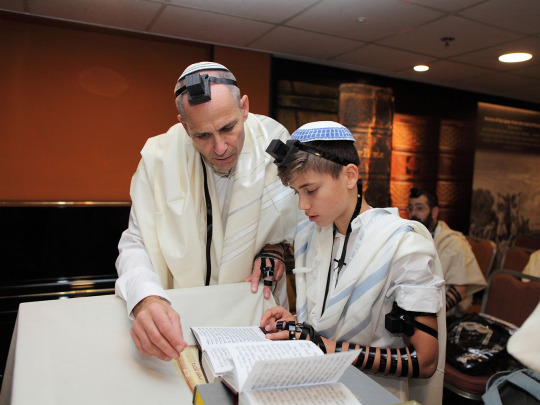
And, at what age does this ceremony take place? For boys, it’s 13 (12 for girls). This real world connection becomes more compelling when we remember that the voice actor for Aang, Zachary Tyler Eisen, is Jewish, and when we note the references to famous anti-Nazi films in a show about resisting ethnic cleansing. (”Bato and the Water Tribe” connects to The Sound of Music while “The Firebending Masters” alludes to Indiana Jones and the Raiders of the Lost Ark.)
Of course, Judaism isn’t the only religion that maintains coming-of-age ceremonies. Many faiths distinguish the pubescent age with ceremony and a shift of spiritual study and clerical responsibilities within the community of worship. I especially love this short series on a Buddhist coming-of-age initiation ceremony for boys among the Shan in Thailand for the way it displaces Western ideas of manhood.
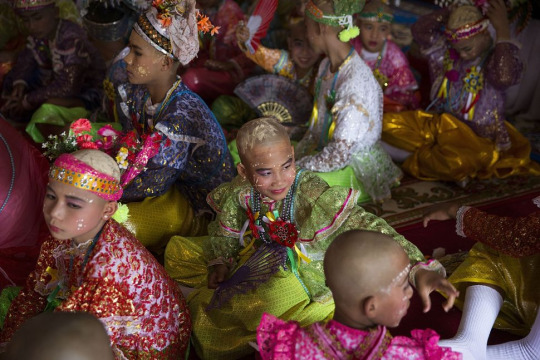
I think we often see, especially in fandom and/or purity culture, a protective zeal to singularly and strictly distinguish adulthood and childhood, and those definitions revolves around sex and sexual maturation. That is often what the coming-of-age narrative in fiction has pervasively devolved into. In fact, a religious coming-of-age ceremony was just as often as not distinct from a culture’s marrying age (which we can infer would be the age sexual relationships were considered expected and acceptable).
The coming-of-age, the transition between childhood and adulthood, instead, was focused on moral and spiritual development. The explanation of wikipedia is concise: “ Before the child reaches bar mitzvah age, parents hold the responsibility for their child's actions. After this age, the boys and girls bear their own responsibility for Jewish ritual law, tradition, and ethics, and are able to participate in all areas of Jewish community life.” We think of Aang, bereft of his mentors guidance trying to do righteously in the world, having now received the marks and celebrations indicating maturity amongst the monks.
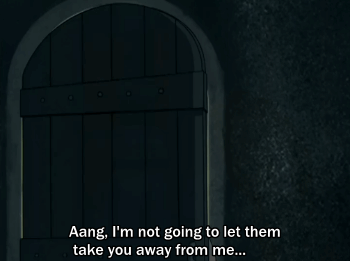
Despite that sense of increased independence, I especially want to point out the aspect of ceremony to invite a child now as a respected peer into a religious community. While the rite may extinguish the nature of a child-parent relationship, it welcomes the young person into a broader network. An excerpt from Britannica’s section on diverse Native American coming-of-age ceremonies explains, “These ceremonies provide structures for instruction in traditional knowledge...They reintegrate an individual into kin, community, and cosmos when new status is attained.” These communal processes shepherd members of a group through difficult changes and do their best to help them arrive on the other side with a clear sense of identity, belonging, and purpose. (Interestingly, this is also the ceremony at which language for new adult names and genders can be given and spread).
In terms of ethnic cleansing, wiping out the coming-of-age rite and its subsequent instruction is instrumental in destroying a people. Even if it doesn’t kill the individuals, it disrupts the network of support and tradition, which dissolves the culture. It’s one reason we witness again and again Fire Nation imperials calling Aang a child. The tattoos mark him as a versed adult among the nomads, but by ignoring Aang’s initiation, the Fire Nation can maintain it’s prideful insistence of total annihilation against its enemy. If Aang is just a kid, he is not a carrier of the monks’ ways.
But as we repeatedly witness throughout the show, Aang has a profound connection to his culture, its traditions, laws, and beliefs, and holds himself responsible for maintaining it, because he did come-of-age among his people. And, the finale is a reaffirmation of this spiritual maturity in the eyes of his community as it exists across time immemorial. ATLA reasserts the importance of ritual and spirituality in the coming-of-age narrative. It’s not about one person becoming mature. It’s about one person maturing to serve the sense of belonging their people in faith have already granted to them.
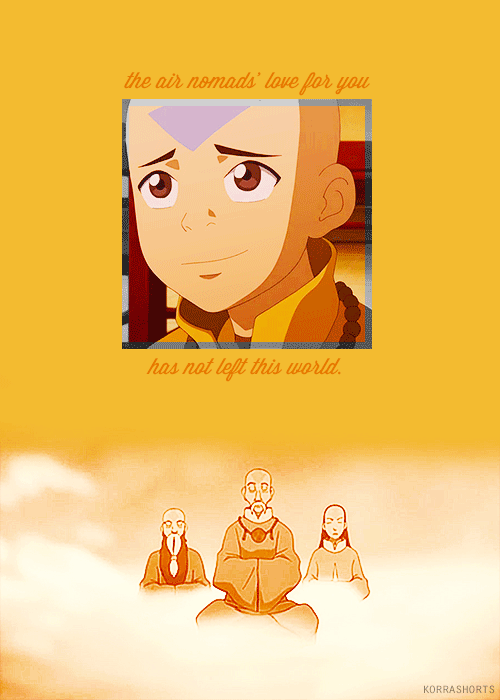
386 notes
·
View notes
Note
Question: Do you think Lucien was always a bad person to some extent? Or was he ok (not necessarily good, just not terrible) and didn't start to be really bad until after becoming the Nonagon and "getting rabies" as Caduceus put it? 'Cause on his wiki page it says something like "Lucien was just a costume he continued to wear," which gives me the impression that he lost his humanity/personality, which makes me wonder how much of the Lucien we met was the "real" Lucien and how much was just whatever was left after being corrupted by the Somnovem.
My personal interpretation is that he started out bad on his own and just got worse after becoming the Nonagon, judging by Cree's "he was charismatic in his cruelty at times" line. Idk, just the way she said that makes it seem to me like he was like that before.
Side note, we know Molly is a piece of Lucien's soul that remained in the body and gained its own consciousness after getting shattered. Maybe Molly was formed from whatever was left of his humanity.
Hoooo boy. This will get long. Buckle in.
The short answer is yes, I think Lucien was an asshole from the jump, but he was made to be that way by the environment he grew up in. He didn’t THINK he had a choice to be anything else and he probably got a victim complex ingrained in his head that he never got out of.
But ultimately, Lucien being an asshole because of racism (since he implies he was subject to a lot of it in his life) and growing up in the Run does make it kind of easy for him to have been at the very least a bastard antihero in the Claret Orders/in the Tombtakers pre-Aeor, so yes. A bad person but not the worst, because Molly exists and if Molly is all the good in him (as Matt actually confirmed) then that means he HAD good in him. And a lot of people are assholes because of trauma in fiction.
My standing theory is the Somnovem took what was already there and twisted it since the Somnovem themselves were twisted to the point of being driven by singular emotions. Lucien became something Other under their guidance in his mind. I’ve talked a lot about Lucien’s clear need to be special and “chosen” and I won’t go into it again, so I’m guessing when he became the Nonagon, he wanted to cast off all of his mortal frailty and lost a lot of his more human emotions in favor of being the thing the Somnovem needed.
There’s even difference in how Lucien acts that distinguishes the two! Matt has two very distinct ways he plays him- the Nonagon who is all theater and fancy words and then Lucien who is an angry hopped up brat. (The Nonagon voice is breathier and higher and that voice also seems to come out when he’s vulnerable too- “I don’t like being abandoned” for example- and Lucien is the rougher “THAT WAS A DICKISH THING TO DO” voice)
So yes. Lucien was always an asshole but aside from being “charismatic in his cruelty” (which can mean a lot of things, especially from someone who is very clearly in love with him) he was probably just as much an asshole as anyone in the series is. Left on his own with no Somnovem, he would have probably been no worse than the worst of the Mighty Nein pre-character development, which is why I think if he was brought back down to normal and allowed to reassert his Lucien Identity over his Nonagon Identity, he would actually be redeemable. But as long as the Nonagon Identity takes precedence, he’s not.
#critical role#lucien the nonagon#Lucien nonagon#I HAVE A LOT OF FEELINGS#don’t give me free reign here
28 notes
·
View notes
Text
Bucky is and always has been very wrapped up in his identity. You can see it in catfa—the bar scene particularly stands out to me as a scene that shows exactly how this traumatized person seeks to take back control by writing the narrative, and how it doesn’t always work when other people are involved.
In the bar scene he’s just been captured and experimented on and generally been through hell for the last however many months of war. He’s grasping at the things he knows about himself for a sense of normalcy after trauma—flirting with Peggy, being the boy the girls love, for one. But there’s also the claiming Steve as his, both in reference to posturing with Peggy and in general just between Steve and himself, for example by reasserting their relationship and referencing it going back to before the serum. The “kid who was too dumb to run away from a fight” line IMO is very telling and pointed—Bucky has cast himself as Steve’s protector; even if that’s really not true, it’s the role he knows how to play from who he was before the war and the one he’s been desperately adapting and struggling with reconfiguring—the big brother, the dashing hero, the boxer, the soldier, the one who knows more about sex and women and the world, the one who gives advice and cares enough to, which is the way he shows his genuine love even if he does a good job masking it inside the appropriate scripts to keep himself from being too vulnerable.
And the thing here is that many of those roles are not genuine, though the feelings that cause Bucky to create the roles obviously are. Early Bucky clearly doesn’t actually care about protecting Steve from some things, for example rejection. Steve in the beginning of catfa is clearly anticipating rejection and has gone through this with Bucky before, but Bucky continues to do it anyway. Bucky actively makes fun and needles at Steve, so he clearly doesn’t treat him like glass in some effort to preserve his feelings or his dignity. I would say Bucky’s frustrated with Steve’s habit of getting beat up, and I do believe much of that is worry, but he doesn’t mother hen him about injuries and he’s not particularly gentle with him after pulling him directly from a fight.
That doesn’t mean being Steve’s protector isn’t a core part of who he believes himself to be. And it’s not just the protector bit that’s important. His relationship with Steve is symbiotic and he knows it. I believe he thinks he gets more from Steve than the other way around, but he’s always believed that he only gets it by offering something to Steve in return, and he’s lost that now. All he can do is protect Steve’s memory. And I think Bucky does worship Steve and always has. And part of that is that his own worth and purpose is completely attached to Steve’s.
I think Bucky had a very well defined sense of “this is how the world works and this is who I have to be to fit into it” that he had to start actively grappling with the moment he got drafted, and that he’s been losing ground on particularly since the moment he was captured, and that’s why it’s so potent in the bar scene. It’s his trauma reaction upon being faced with utter lack of control, to latch onto the one thing he knows and not let it go.
When he came out from under hydra’s control, he went right back into this coping mechanism. It wasn’t so bad when he had Steve, because he could reconfigure his self concept around the old one, around Steve. When Steve was there, he could lean on what he knew and it was solid enough he could build a new identity atop that foundation. But without Steve, bucky’s too busy grasping after the version of himself that’s tied up in that to form any self actualization. He’s barely coping, and he’s doing it unhealthily by creating self narratives that require a outdated view of the world, of himself, and of Steve.
“You buy into all that Stars and Stripes bullshit”
“You were mr. America, cap’s best friend”
Yes. He is and he does. He has to. He has to believe in something, because if he doesn’t have that, he has nothing. It’s not so simple to detach yourself from the narratives you’ve created for protection. But detaching himself is exactly what he has to do to reach self actualization. He has to examine himself, understand that he is not a hero, that he never had control and never will have it, that sometimes everything is for nothing, but that that doesn’t make you a villain either.
It’s all there. “You think this is hydra” when really it’s the us government—he has to face that the us government is not something to protect, that that’s not his real identity.
“As a young soldier sent to Germany to stop a mad icon.” It’s the idea that his government used him and used Steve and then left him behind; that Steve left him. He can’t face it, and more importantly, he can’t face that they should have known he deserved better and they did it anyway. He just can’t afford to disturb the story he’s told himself in order to keep living the life he has.
But letting Sam into his life means that he has to change. He has to let his perception of the world change, bc Sam will hit a boiling point where he needs bucky’s empathy or they will lose each other. The empathy Sam needs is intimately tied up in race because he is a Black American, and he has his own trauma attached to that. And as Sarah says, “we need to talk about this situation.”
#bucky barnes#tfatws#the falcon and the winter soldier#bucky meta#tfatws meta#stucky#tfatws and race
80 notes
·
View notes
Text
i think one of my favorite things about good omens (the tv show), and aziraphale and crowley’s relationship, is how cheesily slow-burn it is. the two of them have been gradually falling in love with each other over 6 millennia of accidental meetings, wiling/thwarting, and clandestine drinks. they’re classic enemies-to-friends-to-lovers: an angel! and a demon!
but good omens the show also has a field day with aziraphale’s apprehensions about the whole thing. from his side of the relationship, aziraphale is continually in flux over whether he really accepts how important crowley is to him.


aziraphale’s development throughout the show is characterized by his ambivalence.
he’s an angel, a servant of god put on earth to do good. that does not include associating with demons on his checklist of holy deeds. repeatedly, aziraphale reasserts his role as the angel, taking shelter behind the straight and narrow that’s expected of him, whenever he feels that that particular sense of his identity is being threatened by his relationship with crowley.
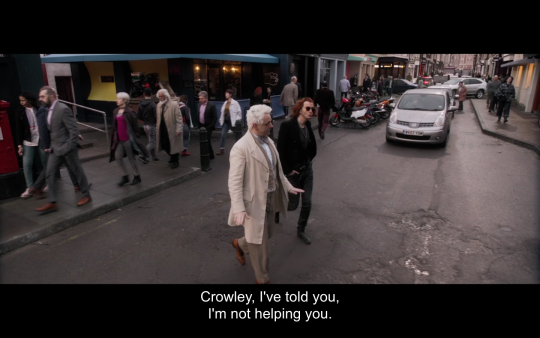

of course, aziraphale then tends to undermine his own assertions.

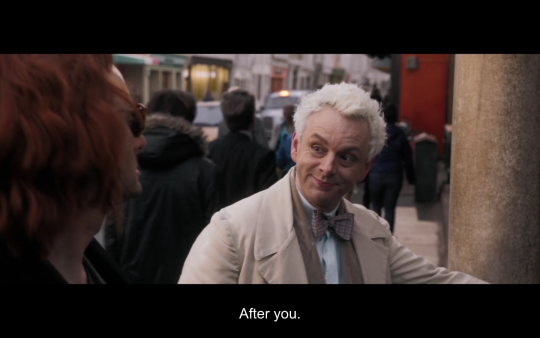
funnily enough, it’s not the demon trying to play the long game of tempting an angel to fall. it’s the angel playing the long game of dancing the line—trying to maintain the best of both worlds: his identity as an angel, his loyalty to god and heaven; as well as his friendship with crowley.
and let’s be real. crowley has been well-aware of aziraphale’s uncertainty for a long time.
unlike aziraphale, crowley’s not interested in maintaining a healthy allegiance to hell or lucifer in the way that aziraphale continually turns back to heaven, to gabriel, and to god for approval or solutions. he does the bare minimum to keep himself bodily and metaphysically intact—and perhaps glean some personal satisfaction from a job well-done, even if it’s a somewhat malicious job.
after all, the evil deeds that he favors? well...
take hastur and ligur, dukes of hell and model representatives of what the place idealizes. their deeds on the day they deliver the antichrist are tempting a priest with lust and compelling a politician to accept a bribe. hastur gleefully kills a nun and sets a convent on fire, while ligur thinks favorably upon the idea of ripping a person’s right arm off. they’re up close and personal. direct responsibility over the corruption and destruction of individual souls.
crowley doesn’t favor that style. when he corrupts, he doesn’t shove a train off its tracks with his own hands. he creates a highway that radiates waves of general ill will, or shuts down london’s mobile phone network to make everyone just a little bit more irritable. when he acts upon his duties as a demon, crowley doesn’t do any more than any other normal human might encourage as a by-product of living in the same world. his deeds are the equivalent of someone cutting you off in traffic, or your cell signal cutting out from non-occult forces.
he preserves free will. sure, he made your day a bit worse, but really, the only one making the choice of taking that out on the people around you is you.
and don’t ask crowley to kill anyone. because frankly, judging by his distaste for god’s flood, jesus’s crucifixion, being the one to eliminate the antichrist? he’d really rather not.
he gave the paintball competitors real guns but ensured they wouldn’t kill anyone. he set a bucket of holy water on top of his door to kill whichever demon chose to come after him but didn’t put any in his plant mister.

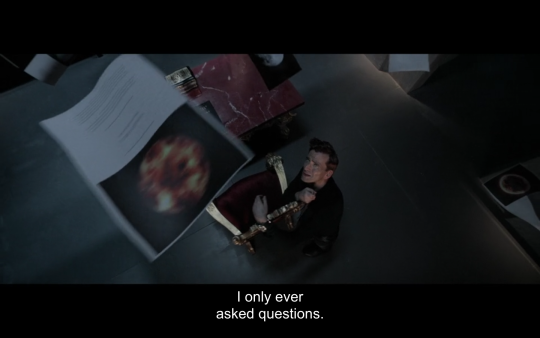
crowley doesn’t have an ounce of real dedication to hell. he was and has only ever been the fallen angel who sauntered vaguely downwards.
so in this, he’s the antithesis to aziraphale’s vacillation. crowley has no ties holding him back from committing fully to a relationship with aziraphale. time and again, crowley is the one who initiates their interactions, who does him favors first, who saves him from discorporation, for no other benefit except companionship. and this frightens aziraphale.
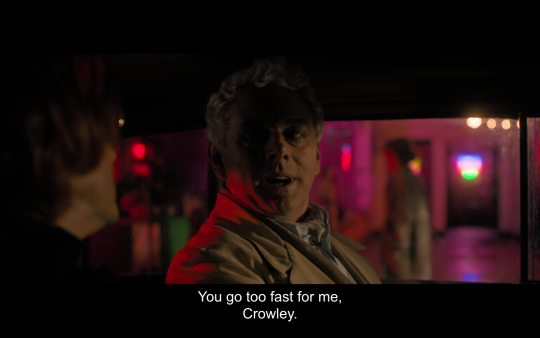
it takes millennia for aziraphale to let down each barrier. and crowley remains patient. he understands his reluctance to leave the welcome arms of heaven behind. even after their 1862 fight in st. james’s park, crowley reappears out of nowhere nearly 80 years later to save aziraphale and his books and rejects the thanks he tries to give. on the day of the apocalypse, aziraphale yells to him that their friendship is over, and crowley still comes back begging him to run away with him to alpha centauri.
but at the same time... crowley refuses to make it easier for aziraphale.

some of his pushback to aziraphale’s generosity can definitely be attributed to difficulties with self-esteem. he’s still done hell’s work, after all, and coming from a place with demotivational posters that are basically depression on paper won’t do wonders for one’s ability to accept compliments.
but being a demon—being a fallen angel—is still central to who crowley is. while he may not hold any loyalty to hell because of it, he’s also not interested in returning to heaven. why would he be, when they cast him down into a pool of boiling sulphur only for asking questions? when they’re just as comfortable as hell with killing innocents and starting wars?
so when the end is nigh, and aziraphale is trying to imply his own solution to saving the both of them...
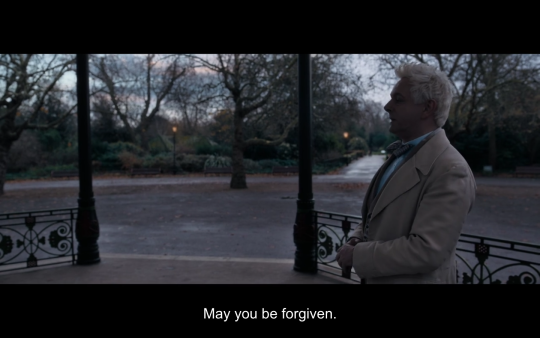

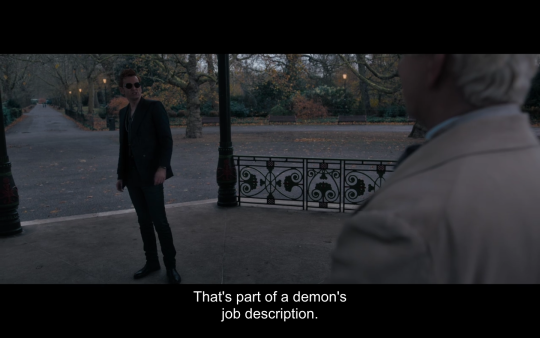
aziraphale has just gone begging to heaven to put an end to the apocalypse. and they told him no. the war has to be won.
he still doesn’t have the nerve to openly disobey heaven’s commands. and in his certainty that heaven will indeed win if the apocalypse happens, the only option that will allow aziraphale to remain on heaven’s side while preserving crowley’s life is if crowley returns to the host.



this suggestion, though, is not one crowley is willing to take.
a relationship with aziraphale is something crowley deeply values. but he won’t settle for an aziraphale that hasn’t accepted the full ramifications of what that entails—whether it’s the fact that crowley is a demon, full stop, with all the implications therein; or that to love him is reprehensible to heaven.
aziraphale’s blind loyalty to heaven and his relationship with crowley are incompatible, a fact that he’s spent the last 6 millennia ignoring. crowley has been patient, trying to allow aziraphale to come to terms with it in his own time, but aziraphale couldn’t balance the knife’s edge between them forever. as the apocalypse approaches, so too does the conflict in their relationship come to a head.

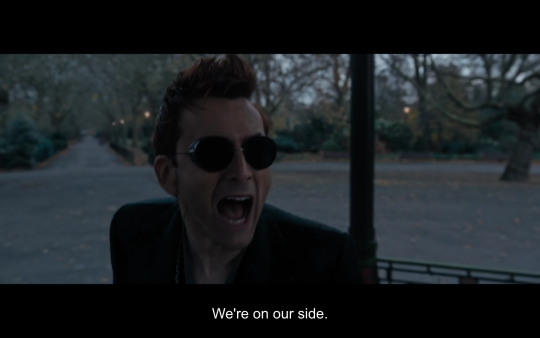
crowley demands that he make the choice.
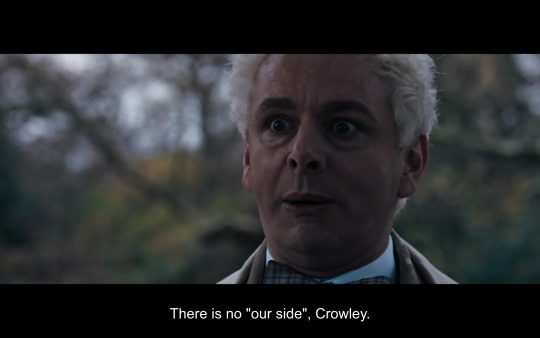
and once again, aziraphale chooses heaven’s will over crowley.
it’s only when aziraphale tries to reason with heaven one last time, talking to the voice of god themself, and has utter failure spelled out to him in the sky, that aziraphale finally accepts that heaven has no interest in the compassion and love that he and crowley value so dearly. the choice between heaven and crowley—was never really such a difficult choice after all.
good omens the show is not only a 600k slow-burn between two mortal enemies, it’s a very human tale in which it’s not the demon that struggles with accepting their desire for love and companionship, but the angel. while good omens the book is as fabulous a piece of source material as a show could wish to have, the show is the story that flips the archetypal denial of one’s love on its head. it’s the being of "evil” that offers the outstretched hand and waits patiently for the being of “good” to take it.
aziraphale and crowley face down against their respective superiors together, against lucifer, against holy water and hell fire.
and a nightingale sings in berkeley square.
#good omens#good omens meta#good omens analysis#ineffable husbands#aziraphale#crowley#prim post#prim says some things#long post#good omens spoilers#they're queer folks!#no editing; we die like men#(ngl. i really wanted to talk about the bandstand scene. i stan ''bad'' characters who are proud of their badness)#edit 7/4: i made a reblog and added more analysis on aziraphale so please look in the notes!!!
12K notes
·
View notes
Text
On the subject of Silver
It’s come to my attention that there’s a lot of theories about John Silver’s motivations floating around out there. I’m a relatively new member of the fandom so forgive if any/all of this has been said, but here’s my two cents on the subject.
When we first meet Silver he seems to have one main motivation: Survival. As subsets to that category one could say he also would like to Get Rich Enough To Never Worry About Going Hungry and Not Feel Feelings Too Much, Thanks. He endeavors to achieve these things through whatever means necessary, abandoning pride, lawfulness, and any sense of guilt to do so. That is not to say that he doesn’t care about anything/anyone else, but his own survival supersedes pretty much everything. He can justify this, in part, because he sees the world in shades of gray. He would consider himself a realist, but is actually a bit of a pessimist. Life has revealed itself to be chaotic and cruel, so much so that John cannot imagine that there is any meaning behind it. And even if there is some grand purpose, my god it must be horrible, so yeah no thanks. Silver would rather have faith in nothing except himself because it’s the surest way to not get hurt and/or die horribly. This outlook sounds dour but it probably felt very freeing once he’d gotten the hang of it. I’m sure John convinced himself that he was dancing through life, though really he was only kinda sneaking through it.
Now I think our boy would have carried on his merry way, manipulating and thieving until he got a share of the treasure, before disappearing off the face of the earth. IF. IF. He hadn’t met Flint. And, subsequently the crew members he befriended, Madi, etc. But it started with Flint. That magnificent, crazy bastard.
At first, Flint was just the most likely means of securing the treasure. Silver saw a dauntless, conniving, ambitious, intelligent, commanding, dangerous, ginger sexpot, honed in on dauntless and dangerous, and decided that Flint had the makings of a powerful, but very much temporary, ally. That was the plan.
Unfortunately for Silver, somewhere along the way, he started to get sucked into Flint’s orbit. He wasn’t a believer, not yet, but he did start to enjoy the push and pull of engaging with his equal in both intellect and will. And maybe he began to be seduced a little, despite himself, by the feeling of belonging as a member of a crew, by being one half of a partnership, by being able to stand alongside such a strong and intriguing character as Captain Flint. He begins to feel valued and, horror of horrors, connected to something. But then Flint’s priorities shift. And he not only lies to Silver about it, he also attempts to manipulate Silver’s loyalties by reminding him that, outside of the crew, he doesn’t matter/no one gives two shits about him. Yikes.
And so we’re back to every Silver for himself, just the way it should be. The only goal is the gold. Fuck everything else, Captain Flint especially. Except, oops, it looks like there was some collateral caring left over because when faced with the choice between avoiding danger or betraying the crew, Silver surprises everyone (including himself) by choosing the crew. He looses his leg in the process, along with his independence and a good chunk of his self-esteem.
This is the point where it starts to become clear that the Silver we met at the outset of this story is being unmade in a number of significant ways. He is obliged to depend on others, he no longer has access to the freedoms he once enjoyed, he must find the strength to weather the grueling pain of his injury, he has to reconcile with the fact that he’s opened himself up to others (i.e. Muldoon) and thus to a whole slew of complications (ew feelings). This is also where he begins to align himself more definitively with Flint.
So we see Silver becoming resilient in ways he hadn’t had to be before, redefining his identity, setting goals that benefit others besides himself, taking on more responsibilities, and falling a little in love with his Captain. Even if you’re tracking this as a platonic relationship, you’ve got to admit that shit got heavy and weirdly intimate. Just saying.
Eventually, somewhere between postulating that Flint might be a god who controls the sea and earning Madi’s regard, we witness the full metamorphosis. Silver has been brought to a place where he can imagine that Flint’s determination, ingenuity, and righteous fury, combined with Madi’s vision, resolve, and uprightness, might be sufficient to rally the numbers and amass the resources needed to achieve the impossible. Hell, for a second, he even believes in himself.
Yes, for one brief shining moment in time John Silver’s whole world-view teetered as he considered how beautiful life could be if only wars like theirs could be won. If only lending his support to the two most important people in his life didn’t mean clawing down a road paved with nothing but endless exhaustion and fear and bloodshed. If only he was capable of truly loving and being loved in return.
But, alas, a rock met a hard place, dissenters rallied against the cause, parties worked to divide steadfast partners, one of Silver’s loves was presumed dead, each side double-crossed the other, trust degraded. For Silver, it was reality reasserting itself, and he was left wondering what in the hell he was going to do with his two very stubborn idealists. One so angry, so committed to vengeance against the society that had killed his beloved and named him a monster, that his only recourse was to burn it all down. And the other, fiercely brave, principled, and responsible for the liberty and well-being of a whole people. Flint and Madi would never stop. They would fight and die for what they believed in. For Silver, who had never been given any reason to believe in anything so lofty as freedom from tyranny, it must have seemed like an incredible waste. It must have also been terrifying to be hurtling towards a future where two such bright, beautiful souls would undoubtedly be extinguished. What was John’s life, without them? What kind of world would it be if they were not in it?
So our desperate, lovesick, cynical idiot did what he felt he had to do - he took their choices from them, betrayed their trust, and forfeited his right to remain in their good graces (while also realizing one of Flint’s greatest desires i.e. the destruction of ‘Flint’, which is to say nothing of the reunion with Thomas if you believe that’s how it really went down). Silver did all this even though it surely meant that he’d earn the disdain of one or both of the people he cared deeply about, and he explicitly states that he did it anyway because at least they’d be alive to hate him.
Did Silver make perfect choices? No. Was his love unquestionably pure? Absolutely not. Was he potentially short-sighted, too controlling, and a little bit of a coward? Yeah, maybe. But he was also a traumatized, complicated man who was experiencing perhaps the closest thing to love he’d ever felt in his life. His final acts were ones of helplessness and hopelessness. To say that he didn’t care, that he wasn’t invested, is absurd to me. I think Silver deserves empathy and I think he deserves forgiveness every bit as much as Flint does.
165 notes
·
View notes
Note
Heya just found your tumblr, i agree with a lot of things you said about armie and hollywood's utter bullshit. what do you think about this whole shit now ? everyone is either a charmie so claim that it's undoubtedly fake or a hater so claim that it's all true. cheers
Hi thanks for coming by! Eh, I think the problem is that he has kinks and fetishes that are just so perfect to use against him; the theme, the ambiguity of the fantasies - especially under this current ‘political’ climate with #MeToo that unfortunately breeds a whole toxic-wokeness and cancel culture obsession.
I’m gonna quote Daddy Zizek (lol) about this.
“We should be very careful and critical with #MeToo. #MeToo is no longer what it was. It doesn’t touch the real social problems. They talk about sex all the time. But it’s not really about sex. For them, sex is only viewed through the prism of power. It’s an instrument of power and power at its worst. Why? Because even if they mostly have the right to complain against male domination, exploitation, their complaint is so clear, it’s not aimed at really helping people. Their complaint is about selling, using your victimhood as a resource of your own power. They want power. And this is such a sad thing that today in many Western society especially the United States, the one of the ways to acquire power in social relations is to present yourself as a victim. If you are a victim, you know you are beyond reproach. And whatever arguments you give against the person who claims to be a victim, you are in advance accused of brutalising the victim and so on.
So I think that #MeToo got too much impregnated with this brutal reality of American academic life, life in journalist circles, in this intellectual class circles, where it’s all about power and career, and again - to complain, to proclaim yourself a victim is one of the ways to reassert your power. I think a new approach is needed here. #MeToo is not offering men another clear positive role. The message of #MeToo should be also to the men - (but it’s) ‘you think you are dominating us, but ultimately you pay the price, you are also not happy’. A proper #MeToo for me would have offered to men a new positive vision. But it’s about revenge, rage, rage, and revenge.
I see these politically correct protesters, how their whole identity is based on proclaiming yourself a victim and blaming others, if you take this away from them they are a nobody in a sense. When somebody complains, always be careful and try to find, identify, what type of additional pleasure, satisfaction, does the act of complaining itself bring to you. We all, when we complain, almost always we find a perverse satisfaction in the act of complaining itself.
So, #MeToo shows, on the one hand, that we have serious problems, I’m not making fun of #MeToo, this is a big movement, but how radically distorted ideologically through the prism of this late capitalist individualist ideology #MeToo movement is.
Anyway, at this point, does it matter anymore if this whole thing was orchestrated by whoeverthefuck or EVEN if the evidence is legit? Of course it was orchestrated; the timing, the people, etc. I know he’s definitely not the only person in Hollywood (and upper-class society) that has niche kinks (I think we learned a lot from Eyes Wide Shut, ha), he’s just the one getting tangled in this. Sadly the fact is that things are leaked and the public loves to cancel every little ‘wrongdoing’ for their own self-indulgment, for all we know Armie has always been walking on eggshells for his privileged identity and outspokenness.
I believe that you don’t have to be a full-on ‘manipulative liar’ to do this. You can have one truth and abuse it to achieve your goal. Being a ‘victim’ is like holding a golden ticket now - where questioning legitimacy and motives are considered evil. And that’s where it gets tricky for Armie and his team, no matter what’s actually going on, under this political correctness - what he should do is more complicated than just debunking leaked things.
Let me know what you think! or PM me.
24 notes
·
View notes
Text
In Defense of Calia: On the Topic of Misogyny and the Criticism of the Forsaken Double Standard
So I like to browse Twitter a lot, mainly for the art but mostly just to kill time. But I also follow people and websites, and one of those happens to be Wowhead. A couple days ago there was an article documenting Calia’s appearance within the Horde Council in the Shadowlands pre-patch, to which she would voice her opinion on the state of the Horde as well as the uncertain future that Azeroth now faces with the breaking of the Helm of Domination and return of the Scourge.
The WoW community can be...very passionate, or inflammatory, depending on your point of view. The same can be said for any big fandom, in all honesty. But I’m not in a lot of fandoms, and, at least where WoW is concerned, there’s a kind of laser-guided hyperfixation in regards to the introduction and development of its characters. Old or new, the fandom watches them like a hawk, but perhaps none more vigilantly than ones that have been mentioned in-game but have not made an actual appearance itself beyond the tie-in novels.
Three of these characters are Turalyon, Alleria, and Calia. However, Turalyon and Alleria are not given this much scrutiny outside of snide quips that “Turalyon is flat and boring/he’s a zealot/he’s the embodiment of the white savior among the draenei” and “Alleria is a fucking psycho for using the Void and wanting the blood elves to return to the Alliance, she’s just like her sisters, it must run in the blood/she’s arm candy to another, rugged Alliance man” whenever the plot calls for their convenience. I would daresay these parts of the fandom would go as far to say that with their developments given within the story, it would be in Blizzard’s best interests to have never brought them so as to “preserve their memory from before the Activision merger”. On the other hand, I would like to note that this sentiment is echoed ad nauseam for practically every character in WoW...but we’ll touch on that a little bit. This piece isn’t about Turalyon and Alleria or the others.
Rather, this is about Calia, and I wanted to give voice to my opinions on the backlash - or perhaps reception would be a better word - she has been receiving. She was a character I came across reading Arthas: Rise of the Lich King and didn’t think much of afterwards; for all I knew, she had died when Lordaeron and that was the end of the Menethil bloodline. However, with her debut in Legion and unique circumstances that followed culminating from the ending of Before the Storm, as well as being tangentially tied with the Light/Void conflict that’ll come to the forefront in the future, I wanted to keep an eye on her character arc.
Needless to say, when I read the Wowhead post, the comments could basically be described like this:
The WoW Community: Gawd, Blizzard is pushing Calia so hard into the narrative. She’s just another pathetic dev’s self-insert like Nathanos is, even though we only base this off some harmless, tongue-in-cheek posts on Twitter and we need to vent our anger toward another character who clearly has too much development! She’s everywhere!
Be me, off to the side, remembering she was only present in the Priest Class Hall campaign in Legion; takes part in Before the Storm before getting axed in the Arathi Gathering and being subsequently raised into Lightly undeath by a king, her Archbishop, and a naaru that may have influenced her into going to the Gathering; only shows up very late in BfA right after Sylvanas Blasts Off Again at the end of the War Campaign to reconnect with the Proudmoores and help the kaldorei undead as well as the Forsaken Sylvanas ditches; shadows Lilian and the Horde Council in Shadows Rising, and shows up in Icecrown when the sky cracks open and Bolvar is no longer the Lich King that took up the role her brother was in.
I don’t know what popular fanfiction you folks are reading (or whatever tea you’re drinking; I’ve been looking around since the last Calia post I made and I can’t find it!), but that is not what I would call everywhere.
Look, you’re more than welcome to despise Calia as much as Nathanos over baseless claims and double standards, but let’s not pretend there are other Forsaken that’d fill the hole Sylvanas left behind. Because they can’t. They won’t be able to, because for years Sylvanas made up the core of Forsaken identity. Prior to WotLK they were a race that was reviled and ostracized by the world and looked upon with distrust by everyone including the Horde, even as Hamuul vouched for them and convinced Thrall to give them a chance despite knowing full well how cruel and selfish they could be. Their sole purpose was to exact revenge on the man who took everything away from them, destroyed their lives, and raised them into his service against their will.
And even when Arthas was defeated, they had no other purpose but to conquer Lordaeron, find a way to reproduce their numbers, and reaffirm their loyalty to the Horde - because where the hell else are they going to go? Because even if some Forsaken disagree with Sylvanas’s strict institutions regarding the acceptance of their undeath and the complete rejection of their former, mortal lives, not everyone in the Alliance is going to welcome them with open arms; not everyone is an Anduin or a Jaina. You see this with Genn, who despite accepting that not every Forsaken is bad still holds them in contempt, and with Alleria, who, after spending a thousand years in the Twisting Nether fighting the Burning Legion and thus being removed from the changes that occurred on Azeroth, is justifiably concerned that they are no longer the same person in undeath as they were in life. You see this in the way that some families spurn their loved ones when the Gathering takes place.
So while it’s true that you can say Calia doesn’t have what it takes to be the person the Forsaken need in a post-Sylvanas Azeroth, you must also remember that of all the named Forsaken we know of only Lilian has been given due development. You can’t say the same for Belmont (a loyalist who disregarded Cromush’s warnings about using the plague in Silverpine, as well as fought a losing battle against Tyrande in Darkshore in BfA), Helcular (a presumably former Cult of the Damned affiliate who notably defended Tarren Mill during the Legion’s third incursion), Faranell (another loyalist who created the New Plague and believes Putress is behind Wrathgate, but perhaps unaware of Sylvanas’s possible involvement), and Velonara (who did not want to be want to raised but followed Sylvanas anyway until the Fourth War, eventually siding with the Horde Council). They are merely foot soldiers; outside of maybe Velonara they don’t have the luxury of experiencing the emotional turmoil a newly risen undead goes through the way Lilian Voss does when Thomas Zelling, dying from illness, makes a deal to be raised into undeath and help the Horde in their war if it meant protecting his family. They don’t have the luxury of watching him get executed by the Warchief’s right hand man in front of their eyes the way Lilian and every other Horde leader present did. You would not get the same weight by switching her out with any of them. You could say Lilian would make a decent successor to Sylvanas, and I would not disagree with you. However, Lilian does not have the familial connection that Calia does to Lordaeron, and while Gey’arah poses the question of leadership to her at the Horde War Campaign’s epilogue, it should be noted that Lilian believes there is “another more suited to the task”, preferring to be the hand that would comfort the Forsaken of the trauma of being raised into undeath and, as of Shadows Rising, act as their interim leader.
Then again, neither does Calia. We don’t know where she and Faol were after Lordaeron’s fall (which is one key detail I have seen people not take into account upon their criticisms of her character), but we do know that upon being asked she had refused to reassert her claim to Lordaeron. However, she has common sense enough to know that Faol was not like the other Scourge in the beginning, and later when she met with Elsie, Parqual Fintallas, and the Felstone family.
Whatever happened during that time period prior to Legion, she identifies with the Forsaken. They are, in a way, still her people, regardless of that. This is why I think she would suit the Forsaken best as their leader, not as Queen of Lordaeron that the fandom - or rather, most of the Sylvanas stans - has been so prone to parroting since her intentions to help guide the kaldorei undead and the Lordaeronian Forsaken were first revealed.
And look, I’m a Sylvanas stan, too. But it is very much apparent that Sylvanas only started the Fourth War for her own purposes, has clearly been in an alliance with the Jailer since Cataclysm (yet is hinted to not be entirely subservient to him), and even if she was doing everything up until Shadowlands as an extreme mixture of For the Greater Good and The End Justifies The Means she was still a toxic influence to the more honorable members of the Horde and to the Desolate Council. Even if her behavior were an act to conceal her true intentions, it would still not absolve her completely for all the atrocities she committed and the suffering she caused. Not even Nathanos, whom people have an obsessive, misandrist fixation of being based on someone who’s not despite being in the game for fifteen years prior to that dev joining Blizzard, would not be the best replacement for Sylvanas. Nathanos - the same man who loves Sylvanas so much he would do anything for her even as he pushes aside the brief moments where he hesitates following her orders and expresses shock at her actions - would not have either the Horde’s or the Forsaken’s best interests at heart, for his belongs only to her. After all, you can’t “redeem” a character if the character himself does not regret what they have done and does not want to change for the better.
Which is another thing I have noticed, in the years I have been in the WoW fandom: the concept of “redemption” in the wake of “character assassination” in the wake of events that caused by said characters that are often deemed questionable, which is what I believe makes people conclude the causation to be a source of “bad writing”. This also ties to what I also believe to be the misogynistic undertones the fandom expresses, simply because the events caused by questionable if dubious methods are done by a woman and not a man, which therefore leads to the notion that Blizzard “hates women”. This gives me the impression that these voices would prefer to have Blizzard write their women as someone who are pure and strong and multi-faceted but the minute she performs an action that not everyone is on board with then she is either considered “ruined” or a “dreadlord”, which is merely a cop-out excuse that you only see applied to the female characters (e.g. Jaina) but not the male characters; those men are simply called “evil” or “genocidal”, whether or not they are rightfully so. Then again, men are also considered “ruined” if they are so much as given the spotlight (e.g. Lor’themar in Nazjatar, Baine throughout BfA), but they are nowhere near under as much scrutiny than the women are (unless it’s Garrosh, then you’re going to have to put up with the “Garrosh Did Nothing Wrong” memes). Which leads us back to the hypocrisy the fandom shows towards Calia, a character to whom people call a “Mary Sue” but at the same time an “abomination” who is going to be “Queen of the Forsaken” that is being pushed by Blizzard to make the playerbase hate Sylvanas even more.
And from what we know about Calia, she is neither seeking to become “Queen of the Forsaken” for the foreseeable future nor a “Mary Sue” (if she were, she would’ve succeeded in making all the Forsaken defect to the Alliance and, you know, not die). Perhaps she is made to question if she is capable of providing for the Forsaken (for some, that is, for it was confirmed by Blizzard that not all Forsaken are willing to be lead by another Menethil, and one who had been missing and presumed dead for years at that). Perhaps she is an anomaly, but she is by no means perfection incarnate the fanbase paints her to be.
TLDR Calia Menethil is a character that deserves a chance at getting her character arc and development, and should be judged accordingly instead of jumping the gun.
16 notes
·
View notes
Text
i wanna talk about piper’s like...meta. as in, the reasons i made certain choices, from their unique magic to their gender. so i am gonna do that! let’s party.
ON PIPER’S GENDER. this is, above all, a nod to the fact that peter is typically portrayed by a woman in the stage show; i love the show and have been in it and i think peter’s androgyny being really emphasized with the casting is great. making piper an agender woman is a nod towards that androgyny. it also adds a lot of great gender tension to a show and character already fraught with it ( and influences why i love trans peter reads so much ) — suddenly, peter’s disgust and infatuation with womanhood takes on a different tone when played by a woman or read as AFAB.
i wanted to maintain some of that gender - complication, that sense of androgyny and of not Really being one or the other. so we’ve got a not - quite - woman pretending to be a man, wrestling with masculinity and femininity and how to perform both, and not really fitting into either of gender roles they inhabit.
this didn’t warrant it’s own section, but their name is based on the pied piper myth!
ON PIPER’S UNIQUE MAGIC. quick refresher : piper’s unique magic allows her to steal someone’s unique magic and a portion of their magic ( and blot ) generally, the trade off being that in the process she gives most of her physical strength to whoever she robbed. this is...not the most obvious choice i could have made! initially, i thought of something involving flight, but that felt too obvious. then i wanted to do smth with a shadow ( had a brief thing where piper could make her shadow move someplace else and then move through it, but that felt like it defeated the whole shadow search thing ) and felt stuck. eventually, i got to thinking about how peter doesn’t exist without the lost boys; he really has no identity separate from those around him. i ended up building a lot of her personality around this concept, and got the idea of some kind of magic that...sort of highlighted that shared identity. piper steals part of another’s Self and in return gives them a part of hers. there’s no way for piper to use their magic without giving up a portion of their identity, without becoming a part of the other.
it also just makes for a nice contrast; piper is defined by aloneness, and is physically very fighty. but their unique magic is only useful when part of a team.
ON PIPER’S FAMILY. initially, my concept included piper having a few little brothers, not two older ones, and these brothers were younger and mirrored the lost boys. part of the reason piper’s parents ( who were at this point based on a less benevolent version of wendy and, to a lesser extent, george darling — they weren’t quite as abusive yet, just wanted her to grow up ) didn’t like her in this version was that she was a bad influence on the boys. that being said, i didn’t like piper growing up in a leadership role ( i wanted that to be something she grew into when she was older — this i’m stealing from peter and the starcatchers, of all things ) and eventually, once i got to talking to syd and i had jean there to be the voice saying ‘grow up’ the family unit shifted. their parents got more abusive, and the brothers became older and got based more on wendy; good to her and instrumental to her growth, but not figures that want her to grow up and instead hope for the opposite. ( this makes diasomnia and / or the magift club her lost boys analogue, lol. )
ON PIPER AND MIRRORS. so i mentioned that i wanted to do something with peter’s shadow hunt; i always really liked it as a sort of hunt for identity, specifically a more natural intuitive identity that was maybe at odds with a projected self. eventually, after struggling with how to integrate this, it got wrapped into her mirror thing. her reflection represents piper’s natural self, who she hates, hence her breaking all the mirrors in her home as a child and avoiding mirrors as an adult. it’s sort of a inversion of peter’s thing; he’s searching for his true identity, and she’s rejecting hers. they tend to see their reflection, when upset, as being younger and having long hair — as she gets older, she grows her hair back out to reassert that identity.
#i dont know how to tag th#meta.#there thatll do#i was thinking abt how the mirrors thing feels like it comes out of nowhere#BUT IT DOESNT!!!!
1 note
·
View note
Text
The Mandalorian S2: Style Over Substance – A Companion Piece
This is a companion piece to this video where I examine the strengths and weaknesses of the first two seasons of The Mandalorian. It’s a collection of ideas and evidence that were cut for time or focus reasons from the main video. I’ve included both timestamps and quotes of what section of the video each idea refers to. Under a cut for length.
[1:48] Akira Kurosawa, whose movies would be very important in the western genre was very big on complete and realistic sets and effects because it helps the quality of an actors’ performance.
“The quality of the set influences the quality of the actors' performances. If the plan of a house and the design of the rooms are done properly, the actors can move about in them naturally. If I have to tell an actor, 'Don't think about where this room is in relation to the rest of the house,' that natural ease cannot be achieved. For this reason, I have the sets made exactly like the real thing. It restricts the shooting but encourages that feeling of authenticity." – Akira Kurosawa, Something Like an Autobiography
[2:27] Like the original trilogy, The Mandalorian has its fair share of humor. The sequel trilogy also had a lot of humor, and was criticized for it, but it wasn’t the humor itself that I think people had a problem with, it was how the humor was done. See, in the original trilogy humor never changed or undercut the overall tone of a scene. If a scene is tense humor might lighten or even break the tension but never undercut it. The original trilogy would never, ever, make fun of the plot, character, or scenes in its own movie. The Mandalorian follows this mold of lightening or breaking tension without undercutting the scene itself which also helps it feel like the OT.
Just Writes video on Bathos is a good expansion on this idea. Personally, I find that particular brand of humor, popularized by the Marvel movies, extremely off-putting because it just screams at me to not take the story seriously and that makes it pretty hard for me to stay immersed in it. My three favorite marvel movies are Guardians of the Galaxy, Black Panther, and Thor Ragnarok because Black Panther doesn’t really do that kind of humor and Guardians and Ragnarok manage to make it seem natural by genuinely being comedies.
[7:18] This brings us to Episode 4. Last time I criticized this episode, but I wasn’t very specific, I just mentioned that we were starting to get away from showing and towards telling. Let’s take a closer look.
The first part of this scene, where the kid was being a nuisance, was actually really good. It kind of seemed like it was going to lead into some genuine frustration with him being a nuisance and therefore maybe some drama in their relationship.
[9:51] Cowboy Bebop is another space western with a strong style and a mix of vignettes and episodes which advance a characters story. But every single episode builds up the themes of the overall story even if the plot has nothing to do with it.
To be fair, not every episode builds up *Spike’s* story and themes, but Cowboy Bebop has four main characters and every episode works towards at least one of the characters’ stories, characterization, or relationships.
[12:20] Mando’s mistrust of IG, when they really have quite a lot in common, speaks to something about his character.
What does it speak to exactly? Well, everyone might have their own opinion about that but here’s mine:
IG-11 used to be a hunter, but now Queel has reprogrammed him. Mando still sees the droid as the hunter and is adamant that it can’t be trusted no matter how much Queel insists that Mando must trust his work reprogramming the droid as an extension of trusting Queel himself.
Now, why does Mando hate droids so much, and particularly this droid? Well, that’s an open question, but I have my theories. Part of it is the trauma he experienced when he was young, but I think it runs deeper than that. You know how sometimes the traits that really bother you the most in other people are the things that you don’t like about yourself? The IG-11 that Mando met is a lot like the part of Mando that I’ve been calling “The Professional.” IG is efficient and ruthless, just like Mando on a job. They are deaf to moral and personal appeals in the face of a contract. This is also the part of Mando that took the kid to the Imperials in the first place, the part that he conquered and redeemed by the end of the third episode.
But IG has been reprogrammed. Just like Mando, he has changed and now cares for the child over himself. IG even develops a personality, and at one point attempts to tell a joke. But because IG reminds Mando so much of that part of him he had to defeat, he can’t bring himself to trust him. The tension between them persists pretty much up until IG fully demonstrates to Mando that he is there both to care for the child, and for Mando. In this moment Mando begins to really see how similar they are.
This connection makes it hard for him to let IG make his sacrifice, and he even appeals to this by telling IG that he thought his old core functionality was gone. But by reactivating his old functionality as a part of his new core function, IG is also giving Mando a template to incorporate his Professional self into his new self. He shows Mando that those two halves of his self that came into conflict back in the beginning can be synthesized into one new whole. He doesn’t need to reject any part of his identity.
Then the newly synthesized Mando dons his jetpack, fulfilling his only stated desire in the entire season, and defeats a scenery chewing villain to win the day.
But that’s just my interpretation, and I’m willing to haggle over what exact interpretation the evidence best supports.
[15:29] Speaking of Luke, let’s talk about fanservice. Now to be clear, there’s nothing intrinsically wrong with fanservice, what matters is what always matters: how you use it.
This also applies to the other two “Trademarked Star Wars Problems” I mentioned in the last video: repetitiveness and hamfisted merchandizing. These things are not necessarily bad. For example:
I would bet Baby Yoda is the most successfully merchandized product since the OT, but there’s nothing wrong with that because they’re part of the story being told. Baby Yoda doesn’t distract from the story, they are part of the story. On the other hand you have Ewoks, which were originally going to be Wookies. I would bet they went with Ewoks at least in part to sell more cute toys…but at least they still sort of work with the story. In TLJ the penguin things are there for no other reason than to be cute and sell toys. Same with the crystal dog. They have literally no purpose in the story, and their obvious and prominent inclusion only to sell toys distracts from my immersion.
Obviously repetition is part of stories. That’s why we have tropes, and the Hero’s journey, as tools for a writer to communicate information quickly. Just from his outfit we know a lot about Han before he ever opens his mouth, same with Obi-Wan. In RotJ, the heroes need to blow up the Death Star again. It’s kind of annoying that we’re literally doing the same thing we did two movies ago, but at least it’s a little different. In TFA Han Solo reassures us that the Starkiller Base isn’t that big of a deal by saying “don’t worry, there’s always a way to blow it up.” This is an example of a character reaching out from the script and telling the writer to change their story because the repetition is getting ridiculous.
[18:32] So…why is it here? Yeah, I know who Thrawn is. I don’t know why Ahsoka does, or why she cares, or why I should care. If the writer had cared about that they would have made her talk to Mando about it so she could give some sort of story or character-based explanation for why she cares, instead of just dramatically saying his name.
I mean I know the most likely reason it was here: to build hype for her solo show, but they could have done that without punching my immersion in the kidney.
[20:20] So it was no surprise that in the end the Expanded Universe’s greatest hit of all piloted his X-Wing into the show. But, I didn’t mind this. They had been seeding that a Jedi would be coming to collect Groghu for a while now, and if you had been running through the timeline in your head you were probably at least half expecting this. It’s foreshadowed well, it’s part of the story, and it triggers our emotional climax.
The reveal is quite well done too. First it’s an X-Wing, then we see a Jedi dressed in Luke’s RoTJ gear but it’s over the security cameras so there’s no color, then we see it’s a green lightsaber, then they clearly show that it’s Luke’s lightsaber hilt, then they finally have him peel his hood back. Each small reveal builds up the suspicion in your mind that it’s Luke until it’s confirmed.
That being said I would totally understand if someone thought it was obnoxious and hamfisted to shove Luke into another story, even though it did work for me.
[29:12] Parts of it even connect back to Mando’s story and character, though not in a new way because it’s mostly a redo of Mando’s relationship with IG last season.
I understand that Mando breaks his rules a little bit more here, but it’s still a riff on the same theme of: Mando has a conflict with a character, the he sees the similarities between between them, and then circumstances force Mando to take his helmet off in front of the character.
However if his arc with the other Mandalorians was functioning properly than this could work as a synthesis of a change in ideology and a reassertion of his willingness to bend the rules, but instead it just comes across as another redo of stuff in the last season. It’s still halfway functional because by this point it’s easy to forget that Mando had a character arc last season and it reminds us of that right before they pull the trigger on his and Groghu’s separation…but redoing the development from last season doesn’t count as a real character arc.
[31:08] There is so much more I could say about all of the bad writing, plotting, and characterization in this season. There are so many things that just don’t make sense, waste our time, or just plain don’t work.
I’m still confused over what the writer was trying to do with the snow planet. Like they crash land there and Mando decides to go to sleep inside his hull-breached freezing ship and the fish chick is like “Mando this is dumb you should fix your ship” and then he just fixes it. What was even the point of handing Mando the Idiot Ball there? Why not just have him fix the ship without trying to commit suicide by hypothermia first? Like…what?
[31:27] Why are you just listing off a bunch of names that mean nothing to us like she’s a video game character telling us where we need to go next?
I want to point out that even though I’m using this footage of Delphine as a reference she’s actually managing to tell you something about Malborn and why he is trustworthy, so it’s actually better than what Bo is doing. Though to be fair the tidbit about “the forest planet” is cute since it will be a deforested planet when we show up, that line needed some character connection to not sound so weird.
[33:13] That’s what the point of Show Don’t Tell *really* is, it’s not about how much dialogue you use or whether a character is explaining something. It’s about using exposition to tell us something about a character at the same time. It’s about putting the camera in a place that shows us something about the character or the action, not just what’s happening. It’s about packing as much of the story as possible into every choice you make.
In Avatar, the way that Zhao tells us about Zuko’s banishment tells us a lot about both Zhao and Zuko. The camera angle here emphasizes Katara standing encouragingly over Aang’s back as he stares dejectedly at the ground (contrasted with Toph’s angry stare) and tells us about the nature of Katara’s relationship to Aang as his teacher and friend as opposed to Toph’s. In the opening shot of A New Hope, the low angle of the camera implies dominance and the length of the Star Destroyer shows us the long reach of the Empire. Every single time Zuko is on screen it is worth paying attention to which side of his face is dominating the shot: scarred or unscarred. Exactly what each side represents is up for debate: I tend to think of it not as good Zuko vs. bad Zuko but more as Zuko’s feelings of obligation to his family and people and Zuko’s obligations to his own sense of what he believes is right and what he needs to self-actualize.
Show Don’t Tell is just a saying. It’s a saying to encourage writers, particularly new or inexperienced ones, to focus on the *art* of telling the story instead of focusing solely on the plot and facts. I am using it somewhat liberally here to say it’s about “using exposition to tell us something about a character at the same time” but since that is about the art of telling stories, and not just a recitation of facts, it does technically count.
[34:32] With television shows and the way they can go on forever, and with how much money there is in going on forever, it seems like they always become a sagging mess at some point. Some of them manage to bring the quality back, but some of them don’t. So to a certain extent, these problems with the Mandalorian are kind of normal for television shows.
I can’t remember exactly where I stopped watching How I Met Your Mother, the last thing I remember is Ted dating some crazy girl and swearing off relationships. I abandoned The Expanse midway through season 2 earlier this year…maybe I’ll go back but boy was I bored. I made it all the way through the Wire. Season 2 had its problems but eventually got back on the right foot midway through or so, but the problems came roaring back in season 5 which it took me almost a year to finish because it was so agonizing.
Avatar is probably the most controversial choice here of a show in which the quality slipped but I firmly believe that if they cut out the second half of season 2 and the first half of season 3 the show would have been much, much better. Most everything in Ba Sing Se is tonally weird and the whole idea of a city with too many rules and bureaucracy is way too complex an idea for this show to tackle. Avatar does tackle incredibly complicated and adult themes for a kids show but in my view this was one step too far. They get Zuko to a place where he’s ready to join the Aang Gang but then have him backslide temporarily. There’s this whole idea of an invasion on the Day of the Black Sun but it would be such a story cheat to allow Aang to beat the Firelord without actually mastering the four elements and so obviously isn’t going to work. All of these things together just make it feel like wheel spinning where the story and characters aren’t actually growing or developing but just being padded out.
Except for “The Tales of Ba Sing Se” and “Appa’s Lost Days” obviously, those are great.
It’s actually pretty funny because the episode before Aang is supposed to fight the Firelord the first time (the Black Sun time) he’s a nervous wreck and everyone is trying out different psychological techniques to try and make him feel better which is…I guess sort of valuable for kids to see that nervousness is normal. But when you compare it to the second time he’s going to fight the Firelord, for real, it’s *so obviously* for real this time because Aang is having a *character* based crisis about the conflict between his pacifism and his duty to stop the Firelord. The comparison of the two is telling in terms of what was going on in the story of each.
[35:03] Now they are spinning it out into not one, not two, not three, but FOUR different shows all based on the Mandalorian. It’s almost gross how hard they are milking this.
Okay apparently they fired Gina Carano so I guess it’s not four anymore. Or maybe it is who knows. Listen, the point is they *intended* to make four shows okay.
[35:06] Thanks for watching all the way through to the end. These videos take a ton of time and effort so that means a lot. Even though I’ve reset my subscriber count to zero now that I’ve criticized the Mandalorian, I will continue to work on the channel as much as I can, so subscribe if you want to see more videos like this.
I promise to always give you my honest opinion.
Also I know I was shooting for one video a month and, well, I still am but these videos are really time-consuming. I want to make sure I maintain a really high level of quality and so sometimes I get halfway through a video, realize it’s no good and have to start over with something else. Sometimes it takes months of rewrites to get it to a place where I’m happy with it. This one came out pretty quickly, it was about 6 weeks from when I started the script to when I uploaded. Hopefully I’ll only get better and more efficient at it as I get more practice.
2 notes
·
View notes